Text
Azula and the Issue of Diagnosis- an Essay Which No One Asked For
With the avatar fandom resurgence, I want to talk more in depth about something that I’m noticing an increase of with the increased interest in the show- and that is the occasionally troubling, sometimes deeply ableist, issue of diagnosing of Azula.
What I tend to see most frequently is the use of words like “psychopath” and “sociopath,” often followed by “psychotic” or “narcissist.” Occasionally I’ll see someone refer to her as “schizophrenic,” and perhaps most troubling of all are the people using ableist slurs against her like “psycho” or “lunatic.” Even words like “crazy” in this context are a bit bothersome- it’s not a word I’m going to advocate banning from the English language, but directing it towards a character who’s visibly mentally ill has an unfortunate side effect of continuing to perpetuate stigma against mental illness.
It’s not cute.
So we’re going to talk about this today. Let’s talk about Azula, diagnosis, and mental illness.
My background
Before we deep dive, however, I want to state this plainly. I have a master’s degree in clinical psychology, and I am currently a second-year doctoral student in a clinical psychology PhD program. I’ve been in school a total of five years post-bachelor’s degree specializing in this field. I work in my school’s training clinic and have active therapy cases with a wide variety of diagnoses. I have patients who were easy to diagnose and patients where it took several months to decide what the most accurate label was. Like many mental health professionals, I have also had my own struggles with my mental health which I am not going to disclose today. But I have been in out of my own therapy since I was a teenager. In short, while I am still a trainee and still operate under the license of a supervising clinician, I know what I’m talking about.
Okay, let’s begin. The rest is under the cut:
Keep reading
#azula#azula meta#atla#avatar the last airbender#ableism for ts#mentions of mental illness#very good post op#this is a very educated perspective on a number of frustrations of mine with how people approach mental health labels#thanks for writing it
1K notes
·
View notes
Text
People uninterested in the unending internecine infighting that characterises parts of Tumblr may want to skip this post. I'm poking at another couple of essay concepts (not Coffin, I don't think I've really got enough information to usefully speculate on the dev update information yet, maybe with the next one), so those might be along soon.
As a post, this is mostly the aforementioned internecine infighting with a brief aside on feminism attached. In addition, it was drafted in one take directly into this reply box, unlike my usual long posts. If that doesn't interest you, that's why I put the cut here.
I am, as a rule, leery of 'calling out' specific people due to the nature of social media, but if you put something out there on a platform like Tumblr, you are implicitly granting other people the right to respond and I'm in a foul enough mood to exercise it.
Make no mistake, for all this post pretends at progressivism, it is absolutely not by any means. It's just appropriating language in a manner that is becoming far too common in online circles.
No, rather than anything 'progressive' this is quite literally trans-exclusionary radical feminism cloaking itself in socially progressive language using a bit of rhetoric to make it harder to accuse them of that without risking backlash. Thankfully, if I were concerned about such a thing, I simply wouldn't post at all.
Not the colloquial sense that everyone uses to describe 'transphobes that don't hate gay people' either — don't get me wrong, this guy is absolutely a transphobe — but the real thing given a lick of paint.
How about I do a quick word replace here, without that coat of paint? Altered words are in bold.
"Biological males are trying to disempower biological females not so that biological males and biological females have equal group powers in [choose your context], so that there is no longer domination by any sex, but they are specifically trying to establish male domination and therefore subjugate women"
Well, imagine that.
Really, my main surprise here is that the words 'female socialisation' aren't mentioned in the post. Then again, given the type of gender essentialism on display, perhaps I shouldn't be.
We’ll circle back around to this later though, to establish some context I'm going to give a brief overview of feminism, a few different types and what makes this specifically Actual TERFism. As this is brief, it will not be entirely precise, but it'll do.
(I have some self-interest here, as a trans-inclusive radical feminist myself I would prefer the people using 'radfem' as a shorthand for 'transphobe' stopped).
Feminism as a basic premise is 'believing in the existence of gender-based oppression' and 'believing it is something that should be righted'. That's all. Most 'not real' feminists that people try to disclaim are, unfortunately, real feminists. It's not a hard bar to reach.
Now, the difference between various stances is on where that oppression comes from and, following from that, what the most appropriate remedies are.
Liberal, or 'mainstream', feminism believes that discrimination comes from the halls of power — governmental bodies, laws, courts etc. — and seeks to remedy gender oppression using political and legal reform.
Marxist feminism, on the other hand, believes that women's liberation will come from the dismantling of the capitalist system — it is those systems that lead to gender-based oppression.
Radical feminism, on the other hand, believes almost the opposite to Marxist feminism — rather than capitalism leading to the patriarchy, it believes that the patriarchy leads to capitalism and exploitation. It is the original sin, so to speak, the most fundamental form of oppression from which all others stem.
Now, radical feminism is not specifically trans-exclusionary, as I mentioned above. Indeed, much of early radical feminism was, if not strictly trans-inclusive due to it not really being in the discussion at the time, at least trans-friendly in interpretation and goals. As an example, I'll quote The Dialectic of Sex by Shulamith Firestone (1970):
The end goal of feminist revolution must be, unlike that of the first feminist movement, not just the elimination of male privilege but of the sex distinction itself: genital differences between human beings would no longer matter culturally.
Trans-exclusionary radical feminism's roots have quite a long history, in large part growing out of the SWERF movement in the feminist sex wars. Indeed, a number of modern TERF luminaries made their bones, so to speak, as part of the anti-pornography feminist movement. I would like to go into more detail here, but frankly I'm not qualified nor inclined to do the reading for this post.
TERFism can be defined as a form of radical feminism that holds to either strict gender essentialism or the idea of a 'universal female experience', usually characterised by an insistence on the centralisation of biological difference or the centralisation of 'growing up female'.
If that seems familiar, well, to finally circle back around to this godawful post and the discourse it sprang from...
The reason I made the word replacements I did is that 'AFAB' and 'AMAB' are literally just the modern way to say 'biologically female' and 'biologically male'. That's what even progressives used to do prior to the language being appropriated by transphobes and more widespread knowledge of intersex folks.
If you're using these terms as identity markers in an argument similar to the above you are erasing people's choice of gender — including your own — in favour of the supremacy of biological sex in order to support a radical feminist position that "AFABs" (remember, this just means "biological women" when used as an identity) must have solidarity with each other against "AMABs" (which is, of course, 'biological males' in this context).
This post is taking a radical feminist stance, that of the primacy of the patriarchy, and combining it with the primacy of biological sex as an identity marker. Which is to say, trans-exclusionary radical feminism.
So whenever you see someone talking about AFABs or AMABs, try substituting in 'biological female' and 'biological male' for those words, to find out what they're really saying.
Or, to put this entire post in the way I would have if I were smarter and made better use of my time:
When's your detransition scheduled, OP?
Transfems are trying to disempower afabs not so that amabs and afabs have equal group powers in queer/progressive/leftist contexts, so that there is no longer domination by any agab, but they are specifically trying to establish amab domination and therefore subjugate afabs because they fear that if afabs are not under amab control they will almost inevitably reconstitute themselves as a terf political force, and therefore reproduce transfem oppression.
The subjugation of afabs to amabs is therefore seen as a way of minimizing the risk of the terf threat, a way to keeping it under control.
You have to get it into your head that transfems see afabs, whether cis, trans or non-binary, as a terf threat.
#using progressive language to mask social conservatism and bigotry is my least favourite part of modern discourse#and there's some stiff competition there let me tell you#transphobia#trans exclusionary radical feminism#transgender#transmisogyny#unlike prior long posts this was entirely written in one take in the tumblr editor#so it's going to be significantly less polished than usual#to be clear basically everything here is simplified it's all very messy in reality#but it doesn't change that OP is full of shit
77 notes
·
View notes
Text
for the love of god if anyone reading this ever ends up in a position where they're running a social media site never try Posting Through It as a PR stratagem to address controversy
#someone confiscate the man's login keys#content moderation#photomatt#come on man hand off your account to your PR team
20 notes
·
View notes
Note
I'm very excited to read your takes on patriarchy influencing their relationship (I'm going to dig through your posts to see if you've already addressed it), but would you please share your thoughts on the difference between "Andy" and "Andrew"? You're an incredible thinker and I absolutely loved the Very Normal Analysis essay.
Fair warning this is off the top of my head and will be lacking my usual justification but my thoughts are...
I think the precise differences are kind of unclear — Andy is described as 'spineless' but it's not really well communicated as to what he even means by that. We can speculate, but that's all.
I don't actually think that matters though, because the important thing is that 'Andy' is who he wants to leave behind and 'Andrew' is who he wants to be. We see two outcomes here, one for Burial and one for Decay.
In Decay, Andrew has bought into his own hype, he is a self-hating guy who's going to try and kill the sister he views as responsible one day.
In Burial, he's much more comfortable with himself and just, generally, a more pleasant guy. But they're both Andrew, right? Just different forms of him. This is going to get into quite speculative territory but...
I would say the big difference there is that in Decay, neither him nor Ashley are really putting Andy away, they're still reading their relationship as being like 'Andy and Leyley's', where the bossy little sister pushes around the doormat elder brother.
In Burial? He's more comfortable with himself and open to reinterpreting his and Ashley's relationship (to put it delicately), he's... well, buried Andy, instead of dragging his decaying corpse around.
That's my take right now anyway, I might have a different one next month!
72 notes
·
View notes
Note
I love your, and some others’, analyses on TCoAaL. Now, about a week or 2 ago, I got the thought in my head that maybe Ashley’s portrayal could qualify her as, if not a manic pixie dream girl, a darker variant: a manic pixie nightmare girl. At least based on the info in the MPDG article on TVTropes. The neuroses and possible personality disorders wouldn’t be negated, of course. Could I have been onto something? Might I have been cooking, or was I just burning a cup of water?
TV Tropes is a viewer-oriented classification of devices or cliches, so the answer is that if you think you saw something, you did.
The manic pixie dream girl trope is an observation of a particular aesthetic implementation of what I will begrudgingly call 'the Call to Adventure' even if I think the idea of the monomyth is broadly full of shit. It's a (usually) flat (as in, static, no character arc) character type that acts as a force for change upon the protagonist and (usually male) his situation.
Given that, what you're looking for is... If you view Ashley as the force for change upon an Andrew-centred narrative and follow the thought all the way through, what does that have the story say? That's more or less how I'd apply the lens, anyway.
I don't generally like TV Tropes for analysis myself because it misuses academic terminology I will die mad about this orients itself from a generic crowd-sourced 'viewer' perspective which can be informative to read about but I don't generally find super useful to apply critically.
#I don't have a huge amount of respect for most of tv tropes critically#some of the articles had someone who knew what they were talking about write them#others... less so#it's a pretty good site for synopses but I wouldn't use it for media critique unless you're making very specific arguments#and even then you need to keep in mind it's a bizarre lens that doesn't make much sense from most critical perspectives#disclaimer: written while intoxicated
10 notes
·
View notes
Note
Hey, did you notice that Ashley looked like she's tearing up when she brings up ____ death during their fight in episode 1? She looked like she's on her limit too there.

Ashley's a very expressive person yeah — she has a great deal more expression sprites than Andrew, just to begin with, and her emotions are... generally written all over her face.
I don't personally think this is a read of Nina's death having affected her greatly but I think it's a plausible indicator that she's, well, not even really in control of herself in this scene.
39 notes
·
View notes
Note
Pleaseeeeee analyze tocoal and Andrew and Ashley more. I think you really gotta hit hard on the hammer that only Andrew can save Ashley. In the sense that in every single possible route Ashley is obviously going to die. Other than one thing and one thing ALONE.
A) Andrew stops pretending to be like “Andy” IN VERY CRUCIAL MOMENTS.
option A) Andrew fully buries Andy and also stops blaming Ashley
option B) Andrew doesn’t pretend to be scared when he has to shoot the hit man. Hes levelheaded and calm as fuck for everything, he obviously would’ve only chose to shoot all the bullets if he was just Trying to act like he was scared. why else would someone empty an entire magazine when he doesn’t even blink at the thought of murdering three people?
In decay Andrew seemingly kills himself after killing Ashley bc he doesn’t want her to be alive if he can’t have her. OR Andrew gets killed by Ashley with the gun. which would ONLY have those bullets if he hasn’t felt the need to “be Andy” and empty the magazine. If he had chose to allow himself to be Andrew (his true self) the decay route branches off too Ashley killing him (her breakdown is so good but she doesn’t say she’s joining him.)
But yeah! Both cases only Andrew can save Ashley and make sure she’s alive but he has to be Andrew for all of his choices.
I think this is an interesting way to look at it! I would perhaps look at Andrew's use of the gun as a more basic expression of fear, in conjunction with his fear of consequences and blame, rather than specifically 'being Andy', but otherwise I think this is a fun and plausible perspective. I would put forth in response to this the idea that Andrew has killed Andy with his choice in Episode 2 on both routes, the potential idea that Burial vs. Decay is about whether they can bury him or insist on dragging his decaying corpse around.
Similarly, perhaps Leyley has to die too, so they can be buried in a coffin together — and whether or not Ashley survives that is an open question.
I'm not entirely sold on that perspective myself, but I think it's worth considering in contrast.
24 notes
·
View notes
Note
do u have a picture of the part where it reveals Andrew has been faking his nightmares? i never saw that in the game and google is failing me
Yup, here you go!
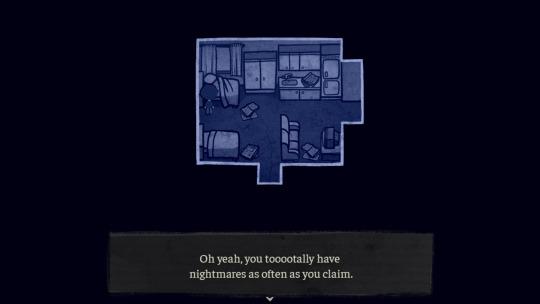
25 notes
·
View notes
Text
Digging Graves for your Morals; Or, The Ethical Problem of Outlawry
Hello, yes, I am here again. This one is shorter, I swear (it’s under four thousand words, even). If this is the first post from me you’re seeing, this is a follow-up to my prior essay posted here on the game The Coffin of Andy and Leyley, although it should be able to mostly stand alone.
At the end of my last essay, I touched on both the game’s nearly uncompromising moral scepticism and relativity, but I didn’t really dig into it. I outlined that the game only textually frames actions as ‘morally bad’ in the context of a morality set by the society and the world that has treated them as no better than farm animals raised for the slaughter. Well, I have a lot to say on the topic of ethics on the topic of The Coffin of Andy and Leyley, so buckle in, this one’s going to talk about the social contract, moral scepticism and everyone’s favourite topic: Mrs. Graves.
As usual, this was originally posted and formatted for on Sufficient Velocity and you can perhaps more easily read it there. Spoilers abound, and my content warning from last time still applies.
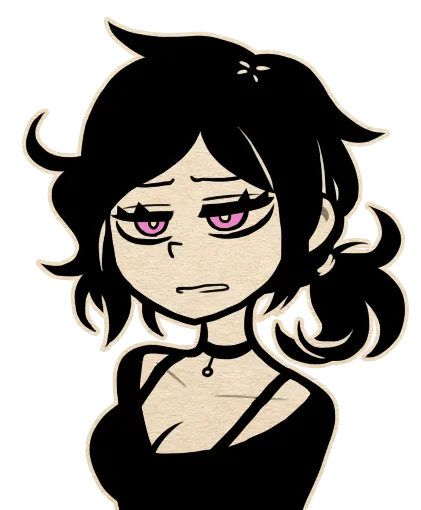
She’s not too hot on either ethics or her mother
The Meat of the Matter
Since a lot of this is optional or otherwise missable information, let’s review the premise the game gives us. If you’re already aware of all of this, I apologise, it won’t take long.
First off the bat, the quarantine at the start of the game was a hoax-driven money-making scheme of which you can pick up more-or-less all the relevant details of. This is entirely missable and by the time it’s possible to discover, our protagonists have better things to dwell on and have dialogue about, so I’ll give you a summary of what you can deduce from reading the notes and thinking about it.
The quarantine is an organ harvesting operation, as per some documents you can discover in the wardens’ office. They entrap the residents, test their blood types and starve to death those they deem surplus to requirements — alternatively the starvation itself could be their method of ‘preparing the harvest’, there’s evidence in both directions and it hardly matters — harvesting the organs of the others for sale. As our protagonists are AB-typed, the ‘universal recipient’ or ‘most selfish blood type’, they’re some of the first on the chopping block.
If you read through the newspapers and the documents in Mr. Washing Machine’s car, you can discover that ultimately ToxiSoda are responsible, and a similar thing is happening in a different city under the guise of a ‘chemical leak’. Should you further investigate matters, you will find mentions of the ‘man behind it all’, the doctor, or the Surgeon, as the fandom have been referring to him — you may recall Mrs. Graves mentioned someone similar! Yeah, he’s the guy who runs ToxiSoda, who are themselves partners with the water company that faked the parasite outbreak in the first place.
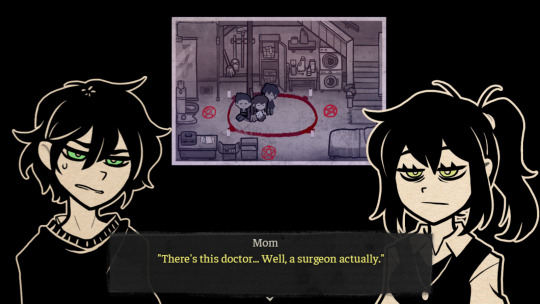
It’s all a life insurance scam, apparently
How much the details of the operation matter is something open to interpretation — it might just be something for players to figure out and Episode 3 will not cover the Surgeon at all, or he might play a major part; it's not particularly relevant to this essay. What matters is that it happened at all — indeed, it’s fairly easy to justify Ashley and Andrew in everything they did in Episode 1 (flashbacks aside), arguing that if they’d made any other decisions they’d have died — an argument that the victims dug their own graves, even if the Graves siblings put them in them. How correct that is is a matter of debate, but that you can make the argument at all matters, and we’ll be returning to this later. In my last essay (and again in the introduction here), I made an analogy to farm animals, raised without love and for slaughter. Let’s put a pin in the ‘for slaughter’ part for now and take a look at the ‘without love’ part.
That’s right, it’s time to meet the parents.
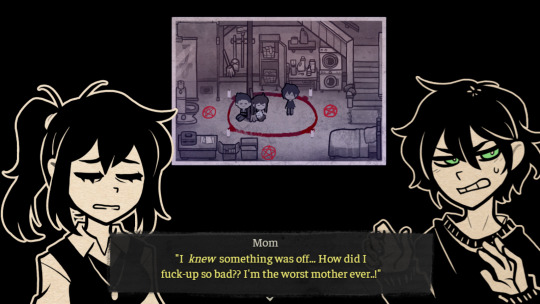
As Andrew notes, there are significantly more compelling reasons for you to say that
They Fuck You Up, Your Mum & Dad
They really do.
Our charming protagonists are, as with many things depicted in this game, an exaggerated, almost farcical example of this phenomenon — one that’s just grounded enough to still feel very real, just like the siblings themselves.
The late and lamentable Mrs. Graves is just the same: originally a teen mother, hopelessly out of depth with two difficult children — even if one was good at masking it — and an unreliable, emotionally unavailable (at least to their children) partner who can’t hold down a job, ends up foisting them off on each other and doing a Parental Negligence because she simply Cannot Cope. That’s the real part. The part where she gets paid off by an organ harvesting operation to leave them to die, that’s the borderline-farcical exaggeration that throws all the nooks and crannies of her character into sharp relief.
Mrs. Graves does not have a good relationship with either of her kids. Having self-admittedly fobbed the job of raising Ashley off on her son, to the degree that they did not even celebrate her birthday as kids, both of them hold differing degrees and types of resentment for her.
For Ashley, it’s hate — perhaps not quite so clear cut as that, as it’s her that calls for the eulogy and she shows some potential signs of discomfort while cleaning up her parents’ corpses, but by and large, it’s fairly simple and straightforward, as usual for Ashley. The sentiment is not exactly unreturned, either.
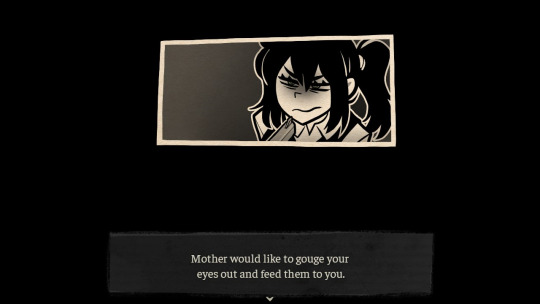
This brings Ashley’s heart great delight!
The most clear incident raising her from everyday ‘neglectful’ to ‘wow she wanted nothing to do with this kid’ is the optional ‘birthday cake’ scene, obtained by finding the present in Ashley’s first ‘transitory world’ dream, in which we see Ashley’s birthday and the founding of a lemon cupcake tradition between Leyley and Andy. She has received nothing from her family, notes that her ‘friends’ would say they were busy before she even told them the schedule and Andy takes her out to buy cupcakes with his pocket money.
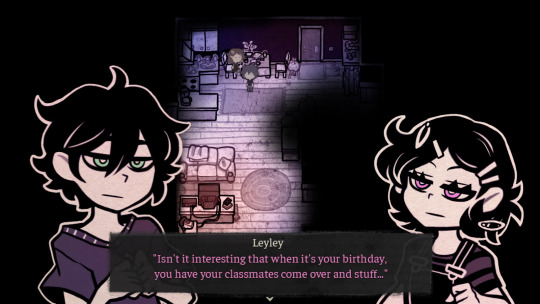
This scene gets a callback in Andrew’s dream later. Just remember to Ask Nicely, rather than Kill Her.
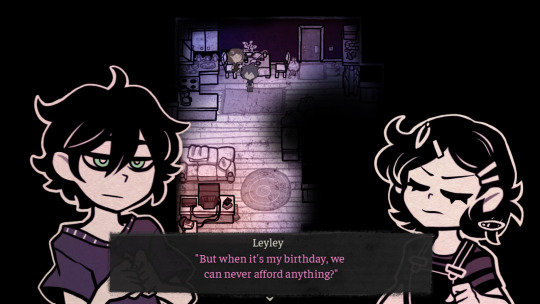
Parents of the year, everyone.
So with Ashley it’s as straightforward and obvious as she herself is — she hates her mother, her mother hates her. With Andrew, as with Andrew himself, it’s a fair bit more complicated. His mother is a much more nuanced figure, who is believable in her role as an unfortunate teen parent who was trying her best. He has a degree of trust in her against, seemingly, his own good judgment In her conversation with Andrew, she acknowledges her fault in raising him and seemingly sincerely tries to offer him a ‘way out’, an olive branch.
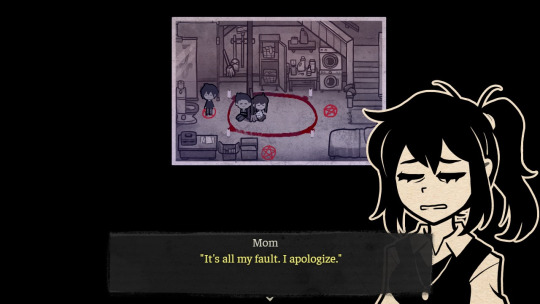
I think many people have had relationships where they might say this
This scene in particular intrigues me, because she is acknowledging fault in a way that Andrew strictly avoids doing — and well, there’s nothing Andrew likes more than a good way to avoid acknowledging any fault of his own. With her dominant relationship over their father as a model for Andrew to draw comparisons to his own relationship with Ashley with, it’s no surprise that the narrative resonates with him to the point of ‘Accept’ being many people’s first completion.
Of course, that’s not all there is to it. There is a fascinating contrast with her later conversation with Ashley, where she — despite accusing Ashley of brainwashing Andrew — refers to Leyley and Andy as ‘two psychos’ and states that she always knew they were responsible for Nina’s death and that, implicitly, they owe her for not turning them in.

There's something about mother-daughter relationships here that I just do not have the time or reading to dig into, unfortunately.
Meanwhile, when Andrew interrogates her on her possession of their death certificates, she has… an interesting, plausible story about a life insurance scam and claims that she really did think they died in the fire, implicitly denying the claim that she sold them. It’s entirely possible that she’s describing the details of the ‘scam’ correctly — you can even buy that she genuinely does care for Andrew in some way, if not Ashley, but her claim about being an honest, grieving parent shocked at their deaths… doesn’t add up?
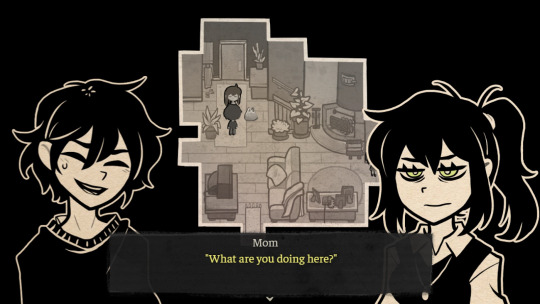
This is a very normal reaction to your supposedly dead children showing up in your house.
As Andrew himself notes after hearing her story, she’s full of shit. This gets into speculation, because there are a few ways to read this, but the most plausible ‘gist’ is that she and her partner were paid off in money and jobs to not raise a fuss — the surgeon she mentioned is almost certainly the founder of ToxiSoda, remember?
The overwhelming difference in presentation between how she speaks to Andrew and Ashley invites investigation — and when Andrew turns down her offer and tells her he isn’t interested in her offer in Decline, her reaction isn’t… despair, it’s shock — and well, there’s a good reason for that.
Why do you think she did it in the first place?
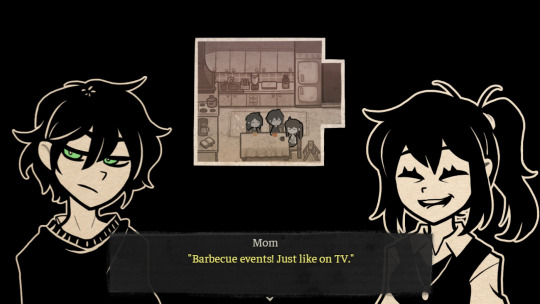
This is the happiest we see her
Well — it’s so she can finally fit into society. That white picket fence, that idyllic 1950s life — hell you can call it the American Dream. She wants that, or as close to it as she can get — the working-class teen mother, living in poverty, aspiring to the middle-class. It’s a very common, very real and very grounded motivation.
And to that end, she effectively sold off her children. It’s no wonder she can’t fathom why Andrew wouldn’t choose the same.
That’s the part that makes you think — just like the deaths in Episode 1, well- maybe the siblings are justified here, too. It’s a weaker argument, but it’s still one you can make under many common moral paradigms today — what goes around comes around, all that jazz. Just look at how awful she was to Ashley.

She’s finally found what she’s been striving for.
Here’s the thing, here’s the thing though — what, reasonably, could she have done? Andrew and Ashley briefly highlight this in conversation about Ashley’s ‘friends’ in Episode 1 — was she supposed to fight gunmen to try and break them out? Throw food to the balcony from four stories?
Moreover, as she herself says to Andrew… would anyone really have been able to do better than her in her position? She was seventeen when Ashley was born, living in poverty with a partner who couldn’t even remember Andrew’s name when he was a kid. Anyone would have had difficulty, let alone with these kids.
Her evils are — they’re not any deliberate action, but rather… prompted inaction. She didn’t have the emotional energy, resources or plain capability to properly parent her children, she didn’t have any solutions to their murder of Nina in a state so blatantly hostile to its underclass, she didn’t have a way to connect with Ashley and she took the money rather than fight a futile and likely suicidal battle against a corporation and its armed goons in a dystopian setting.
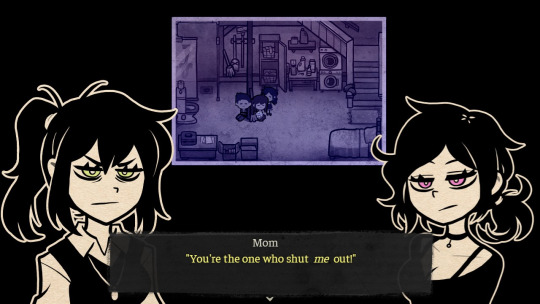
Ashley, notably, does not deny this.
Her sin is the one we’re all, I think, guilty of — that of not trying hard enough, that of inaction in the face of difficult tasks, of not standing up on principle because it’s just too much that day and you don’t have the spoons, you’ll do it tomorrow (no you won’t). It’s a petty, everyday kind of evil — that of not doing enough.
Is that enough to condemn her? Certainly, there’s a pretty manipulative read of her that likely has some truth to it — in the locked door in Ashley’s dream in ‘Decay’ you can discover that she has a ‘not-hatched’ tar soul — but consider that lens — the game won’t make up your mind for you, so you’ll need to choose that for yourself.

The dad is interesting in terms of negative space — but he’s mostly important in that he doesn’t matter, so I decided to not fit him in here. He has art, though — just no sprite, because, well, he’s never mattered to either sibling.
The Contract We Call Society
Right, it’s time to get a little bit Theoretical in here. Not much, but a little. Social contract theory is a complex topic with a lot of nuance, much of which I will be eliding in the name of not writing a twenty thousand word paper on semiotics, law, and anthropology, but the short analogy is… the idea that as long as you play by society’s rules, as long as you are a good citizen, a good person, the state, or the community, will take care of you.
In a number of ways, the harshest penalty levied by many historical states and legal codes was not death, but rather the criminal status of outlawry, a practice that’s cropped up a number of times in history — the practice of no longer being protected by the law. This meant one could be killed or worse with impunity — you were no longer protected by mob justice and, while overexaggerated as a term of reference, certain texts from Medieval England refer to outlaws as bearing a wolfshead, ‘for the wolf is a beast hated by all folk’. Never minding that wolves are actually delightful, this was a time when wolves were actively hunted and sold by people — and the same was intended to happen to outlaws. They were ‘fair targets’ as far as society was concerned, no longer to be treated as your fellow citizens.
This was the gravest punishment on the books, for most of these legal codes — something saved for those who had broken the social contract so completely that there could be no turning back (civil outlawry is… a bit different, that’s not the topic here). Among others, a modern critique of the concept is that it offers no incentive for improvement, no incentive to change or to cease harming society — if an outlaw has none of the social contract’s protections, what reason do they have to obey… any of the social contract? If that seems familiar, well, let me ask you this:
What if the state or community fails its end first? What responsibility does the innocent outlaw have to that contract?
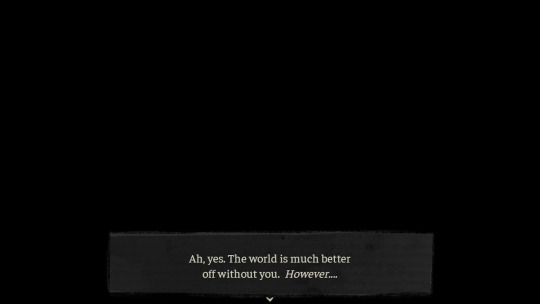
It’s an interesting phrasing, that the world is better off.
It’s time to talk about the incest, and part of why it’s there. The cannibalism too, but that’s less impactful here. If you’ve seen me elsewhere, you might have seen me say that the incest is a load-bearing narrative pillar — in large part due to it being a critical facet of the siblings’ relationship, but in another large part due to it being an equally critical part of how the game uses taboo.
A taboo is in this context something that is considered repulsive and to be avoided by society. It’s a more complex term than that — you can also use it for certain sacred actions or utterances that are only permitted to certain people, for example — but that’s what it is here. Swearing, premarital sex, BDSM and murder are, approximately from weak to strong, some example taboos held in modern Anglospheric society.
Strong taboos are a staple of horror — they shock, they disgust, they draw people’s attention and it’s that last one that’s critical here. Incest is a very strong taboo — while I am absolutely not segueing into its historical context, the very well-established Westermarck effect gives it a certain timelessness and immunity to desensitisation that most other taboos don’t have — murder, to contrast, is a taboo we’re largely desensitised to in modern media and works of modern media have to put in actual work to make a murder seem horrifying — through atmosphere, cinematography, evocative prose etc.
And this is important because the use of taboo I’m covering in this essay is that the incest is used to invite judgment — it is so ingrained as a ‘wrong thing’ in people’s brains almost regardless of background that it forces the player to engage with the work morally. And that’s where the fun starts.
I’ve mentioned before, very briefly, about the juxtaposition of tone between the Burial & Decay endings, contrasting with the very monstrous difference in morality. Burial is remarkably light-hearted — they play around with the drain blockage, they joke about their mother’s personality and this is further exaggerated on the Love path, where Andrew is much more comfortable with casual contact and the two make a game out of how far they can throw their parents’ skulls, the humour is directly contrasted against their abhorrent actions.

I’ll be real Ashley is far more merciful than I, I’m shuddering at the thought of that gunk in my hair
In comparison, Decay is… bleak. I’ve seen it being referred to as being ‘emotionally sandblasted’ and, yeah I think that’s fair — it’s uncomfortable, it’s heavy and it’s just not fun. And this is the route in which, if you chose Trust into Accept, Andrew has bought into the narrative that his mother’s offered — that he can fit just fine into society if he wasn’t stuck, if not for Ashley — the route that ‘fits’ most closely to the social contract, to Andrew feeling the guilt that we think he should and hating the monsters that they’ve become, as the social contract deems them. Given the pains the game takes to attach the player to the protagonists, this normative moral ending is very easily interpreted as the bad ending.
And well, isn’t it?
Thing is, as mentioned above, the social contract has never held up its end for them. The game takes careful pains to point out to a viewer that they’ve never had the life that society promises people, so why do its moral standards apply?
The game invites you to judge the characters, and in the same motion, asks you from what principles you judge them, making a pretty good guess in that, like most people who haven’t spent a large amount of time navel-gazing and reading some very boring books by very dusty old men, they come from the society around you.
Love even has Ashley express this sentiment directly after the incestuous dream — she asks you — well, Andrew, but this is also something for the player to mull over — why this is what’s engaged your morality or sense of revulsion, rather than the desecration, cannibalism or murder.
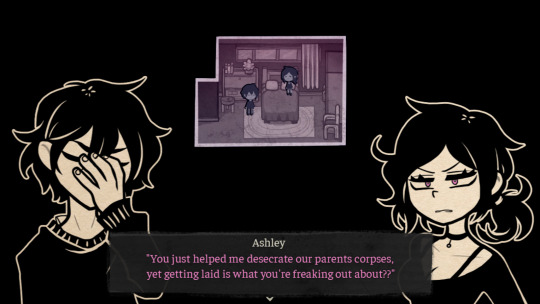
Andrew and Ashley are both very funny and very fascinating in this scene.
And that’s the framing that it casts all of its own moral judgement in — even the ‘tar-soul’ aspect is… well, it’s unclear what it even means. Mrs. Graves was a ‘not-hatched’ tar soul, after all. Other than that, it’s society and the world being better off without them, rather than any kind of assertion of objective morality. Due to the present of ‘soul colour’, we’ll presumably see the game make some moral statements in Episode 3, but as it stands?
It’s nearly completely morally sceptical, in and of itself — it’s not interested in moral assertions or education, it’s interested in making you question your own morals. Deconstructive (not that kind), rather than dialectic, to be mildly pretentious.
It uses taboo and shock to invite moral judgement, but then uses tone, charm and our instinct to look for the happiest end for our blorbos to get you to recognise that these are principles you yourself brought into the game, rather than any it’s handed you.
To summarise: you’ve brought these principles in from society, but what do the siblings, the protagonists, the villains to the world, owe society? Enough that they should follow them? It failed them first, after all.
Closing Thoughts
This one is a bit less energetic than the last, tragically — my sleeping schedule is the stuff of nightmares recently, I love windy weather. Wait, no the opposite. Huge thank you to everyone who commented on the last one, you are the wind beneath my wings and the main reason I managed to get this out this week.
This essay is a bit more interpretative than my last one — certainly, there are alternative readings and I’ve been toying with the idea of deliberately taking a reading I don’t like very much and writing from that perspective as a demonstrative exercise recently — mostly that you shouldn’t just take my word for things!
Otherwise, if the last bit at the end seemed murky, I apologise — I did try to write a more detailed version, but firstly, it was three thousand words and secondly, I re-read it the next day and I could not understand what the fuck I was talking about. Personally, I blame Derrida — suffice to say that I strongly recommend playing through it with an eye towards considering culpability, morality and why you think certain characters are more or less forgivable than others, and for what deeds. See what you get out of it.
I managed to keep one particular thread open to wrap up with here — I try to keep speculation on Episode 3 content to a minimum in the main essays, but it should be fine here — you might have noticed that I refer to Episode 1 and Episode 2 being on something of a spectrum of justifiability, with the siblings’ actions being ‘more’ justifiable in Episode 1 and ‘less’ justifiable — but still justifiable if you try — in Episode 2.
To continue the thought of the happiest ending being the one in which they step the furthest away from common morality and to further jar the viewers’ sense of morality by contrasting societal morality and blorbo-oriented morality, Episode 3: Burial could continue this trend in having a major victim be someone who, well, has done nothing wrong and isn’t even guilty of bystander syndrome.
I wonder if there’s any good candidates, someone who’s sweet, harmless and will indisputably be an innocent victim…
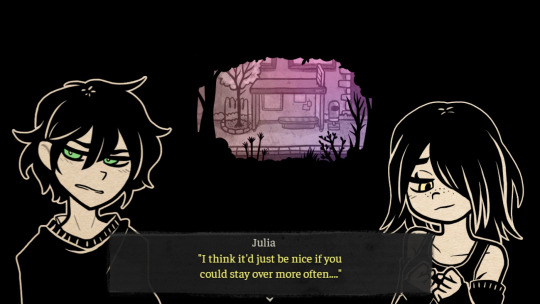
…I’m sure she’ll be fine
#the coffin of andy and leyley#tcoaal#analysis#essay#ashley graves#andrew graves#mrs graves#nnnnot sure what the next topic will be#might do a deranged take on purpose#this one and the last one have been very grounded#I'll get to my asks tomorrow#probably#I've been busy sorry
370 notes
·
View notes
Text
(SPOILERS) Ashley, self-esteem, and starvation
So, I adore Ashley. She's this intensely toxic, vicious, cruel, manipulative girl, and her psychology gives me hella brainworms. Andrew's not the only one whose head I wanna crack open and root around lol. She's thrown away the world just to keep her brother by her side, and she'll continue to do worse and worse for the same reason. She's pretty awful! I've been thinking about why, though. How did things get so bad? How did her soul get so dark?
We don't know everything (I'm waiting for those new eps patiently aND CLAWING AT THE WALLS AND FROTHING AT THE MOUTH but whatevs y'know whatevs I'm normal. I'm fine), yet what information we have been given is bumping around my brain like a DVD screensaver on hyperdrive
It's clear from the start that the roots of Ashley's issues lie in her horrible, neglectful upbringing, but it's hinted that even those outside of her family felt the same abt her. I'm lowkey even betting we'll learn later on that she was ostracized by her peers somehow. However, what's most disconcerting, I believe, is how little she was when the results of this alienation are first made apparent to us (bc kids aren't dumb; they notice this stuff oftentimes instinctively, impossibly young, before they even know what it means to be hated), and how devastating the consequences were.
(There's something decidedly childish abt her dream sequence in the "questionable" route—filled with crayon scribbles and rabbit plushies, the metaphors simplistic yet profound—which really hammers in how these sentiments are things that have made a home in her since childhood. Formative subconscious truths.)
Growing up unloved and noticeably unwanted by virtually everyone around her likely left her with a gaping hole in her heart that she'd spend the rest of her life trying to fill. She'd make friends, but she'd always worry that they'd leave her, that they'd betray her, nothing tangible or weighted enough in their connection to trust in its persistence. Why should she expect otherwise? Not even being bound by familial ties ensures affection if her parents are any indication.
Every lesson she'd ever learned had always taught her this: you are easy to abandon. You cannot love and be loved by virtue of your own worth.
You have to rip their affection from their clenched hands if you want it so bad.

This understanding carries with it an undercurrent of degradation, instilling within Ashley a constant, biting inferiority complex which will never fail to be a source of insecurity. She will always be put last. She was difficult to raise, so her parents gave up on raising her. She was difficult to get along with, so her friends gave up on getting along with her.
It's an odd cycle. She's difficult bc she needs to be to get attention, but bc she's difficult, she can't keep it. Not without having whatever fondness she's managed to cultivate within someone fray at the seams, volatile and prone to collapse, bleeding toxicity.
Hence, her relationship w/Andrew.
By being the only reliable constant in her life, caring for her and keeping her company, Andrew essentially became her only source of happiness, and she's since learned not to bother with anyone else. Still, it's dangerous to keep all your eggs in one basket; since he is all she has, she must protect her place in his life with even greater ferocity, which becomes a torturous ordeal when coupled with her damaged self-esteem.
It's apparent in her quarrels with Andrew that she needs constant reassurance that she is wanted in some capacity or perceived in some positive light (getting pouty when Andrew says he's "stuck with her", needing to hear that she's pretty, needing him to "choose her", wanting him to say he loves her back, etc. etc.), yet her insecurity remains, bc unlike her, he's got options. She doesn't think he needs her like she needs him. He's got a gf, their parents love him, her friends love him. Why would he settle for her? What if someone better comes along? Someone she can't scare away?
Wouldn't he just leave her like everyone else?
Even before getting locked in the coffin of their apartment, starvation's been a constant theme in Ashley's life. She's constantly aching for love, and Andrew's the only one who can feed her. When you're forced to fight for a bite to eat or suffer every moment you hunger, you become ravenous—covetous—when faced with food; you don't want the hunger to return, so you lock down the source of your sustenance, wary of its retreat. Ashley's in a permanent state of intense insecurity, always anxious that the love that gives her life will leave her.
Andrew knows Ashley better than anyone else in the world, and it's obvs to everyone and him how desperate Ashley is for him, but I don’t think Andrew has truly, consciously processed the depth of that desperation. It's there buried in his head somewhere no doubt, but rn, he doesn't operate w/the direct awareness that he is everything. He is brother, mother, friend, and soulmate. He is life and love, air and water, everything that is good in the world—everything that there is to justify existence.
It's heartbreaking, in a way, that it's so difficult for Andrew to convince her of his loyalty. This goes further than his tendency to hide his true feelings, bc when push comes to shove, he's at her beck and call. Objectively, he's hers. She doesn't see that bc all she sees is all the ways she can lose him.
So, she gets bratty. She gets pushy, possessive, territorial. Manipulative. Gets under his skin, guilts him to exhaustion, bc she can't see him staying any other way, bc he doesn't get it, bc it works. He bends to her will, for her sake. For now. It's always "for now", bc he'll start slipping away again, and then it'll get worse. She does worse.
Becomes worse.

#yes exactly#we share the same breed of brainworms I see#I didn't get to dig into this in my essay quite as much as I would have liked but Ashley's mentality is so... childlike#it's almost simple and straightforwardly illustrated for you in crayon and plushies#whereas you have to really dig and dig to see what andrew's about#and he's the one that's so insistent on growing up and no longer being 'andy'#but does he even know who andrew is without andy#there's some kind of metaphor for adulthood in there#if you squint#the coffin of andy and leyley#analysis
586 notes
·
View notes
Text
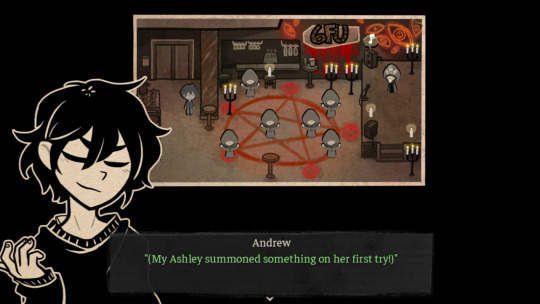
This sequence is the first time we get to see Andrew’s internal monologue and boy is it fascinating.
She’s his Ashley, but he refuses to be her Andy — we see this most clearly in the blood oath scene, where he manages to ‘have it both ways’ — he’ll be her best friend forever, but there’ll be others and — I think it is generous in the most to suggest that he isn’t aware of her obsession with him, given his uncanny accuracy in hitting her insecurities when he’s annoyed with her.
He just doesn’t care — he barely cares about anything. We see him break up with his girlfriend and his chief concern is, as usual… dodging blame. It’s Ashley’s fault, why is he the one being held responsible — he’s not actually upset he’s just annoyed he’s being blamed at something that’s Ashley’s fault. You know, just like everything else. I could have written this essay entirely about that confrontation, so forgive me for referring back to the Episode 1 climax — what makes him ‘snap’ is Ashley telling him that it’s his fault not hers.
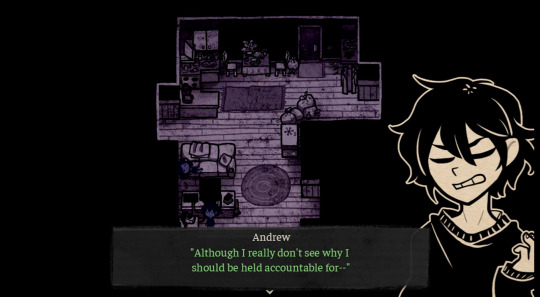
Andrew having a very normal reaction to being told his sister has been conducting a harassment campaign on his girlfriend and she’s breaking up with him. Incidentally, did you ever notice that there’s no way he could have heard those voicemails you see in Episode 2?
And that’s the one thing he needs her for, the one thing he tells himself — it’s all her fault. His biggest fault is that he’s an extraordinary doormat.
But he doesn’t have to stay that way. There are two major branching routes to The Coffin of Andy and Leyley — Burial and Decay. Which you enter hinges on whether Andrew chooses to Accept or Decline his mother’s olive branch — you may also enter Decay by choosing not to trust Andrew alone with their parents. While not the topic of this essay, it is notable that Decay may be entered into by a choice by either sibling, but you require both to make a choice committing, in some way, to the other to enter Burial.
In Burial, Andrew accepts that actually, he wants to be here. He uses his cleaver to threaten his mother about talking that way about Ashley, he jokes around with the corpses of their parents with Ashley, he is much more upbeat and — for lack of a better word, free. He repeatedly affirms his commitment to her, and ceases to attempt to pass any kind of moral judgment on her.
In Decay, he tells his mother he wants to accept, but he can’t — he’s stuck. He really wants to be normal, he wants to fit himself into the same slot in society that she’s crowbarred herself into but — he can’t. Ashley’s made it impossible, and he’s come too far. It’s all her fault.
In Decay, Andrew hates Ashley. He is bitter, angry and suicidal in the aftermath of their parents’ murder and refuses to play around with her or even share a bed with her any more. He wants her dead and Ashley receives a vision of him killing her — something she can only avert with her gun, which is the topic of a hypothetical different essay.
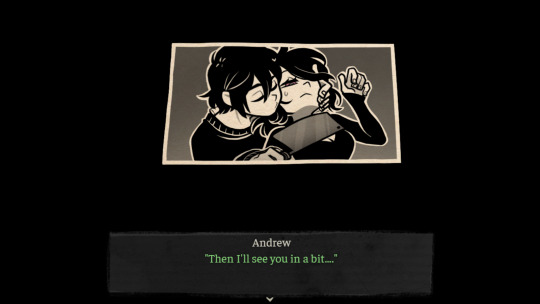
Remember that chatter about double suicide back in Episode 1…?
Here’s the thing, here’s the thing. I said it was all about Ashley earlier and it is — we talked about how even Ashley’s obsession with Andrew ultimately was driven by her own self-perception and insecurities, which caused it to develop into the all-consuming codependency it is at the start of the game. In short, even Ashley’s obsession with Andrew is about Ashley.
And it’s the same for Andrew’s obsession with Ashley — at least, to begin with. He needs her to blame, he needs her to spur him to action, he needs her to validate his worldview and he needs her to belong to him. But, but, but-
In Episode 2, Andrew chooses whether to believe his own lies or not. In Decay, he commits himself to acting how he ‘should’ in his role, his love for Ashley becomes hate and he genuinely, truly, wants them both dead — Ashley is freaked out by the change in him, and when she asks him what he wants, he tells her he wants to lock her in the boot of his car and drive into the ocean.
On the other hand, in Burial he acknowledges that actually — he’s exactly where he wants to be. He doesn’t need her to validate him, he just wants her, he wants to make her happy and he wants to be with her — in the Love branch of Burial, this can obviously manifest in the infamous ‘incest route’.
But the one thing that stays the same across both is that even if he hates her, he can’t live without her, he needs her in a way that arguably, if she ever like, addressed her insecurities… she wouldn’t need him.
He wants to possess her, to have her belong to him completely, he needs her like he needs air which is similar yet contrasting with Ashley’s desire to occupy every possible facet of his life as exclusively hers to validate herself. He wants to own her completely, she wants to be everything to him. They’re not quite the same. And like, that’s a strong statement, but, keep in mind-
Andrew wants to fuck his sister.
Even if you don’t go Burial, even if you don’t take the ‘I know what I’m about’ option… this doesn’t change. We’ll assume that this is not Fire Emblem: Three Houses and that player choices do not retroactively alter character beats or retcon anything — at most, events may be recontextualised.
And uh, listen. I’m just going to let these screens speak for themselves for a bit.
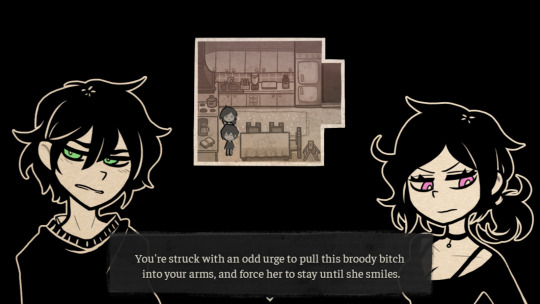
Immediately following the above, he’s shoving it all to the back of his mind where it may fester with all the other thoughts he wished he’d never had. That’s more or less a quote.
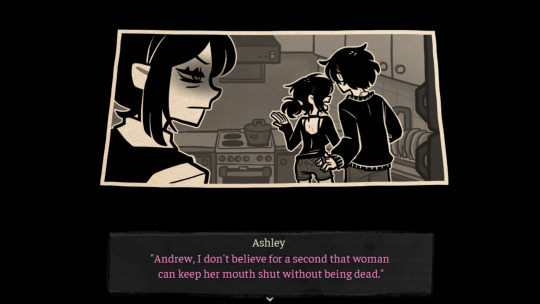
Why is your hand there, Andrew?
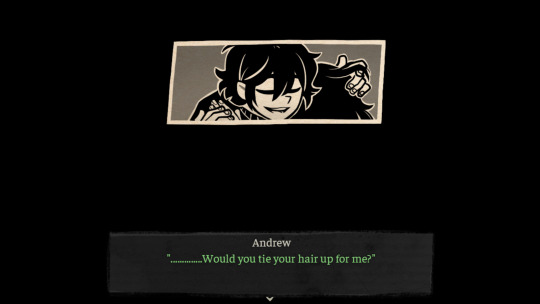
Why are you asking your girlfriend to wear your sister’s hairstyle?
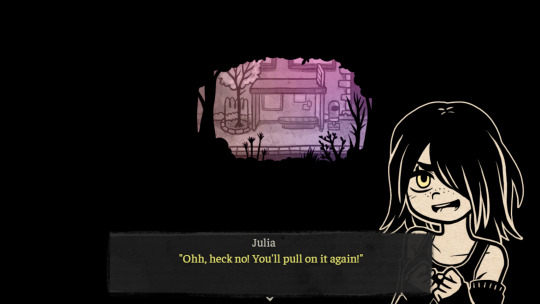
Which is, apparently, a common event.
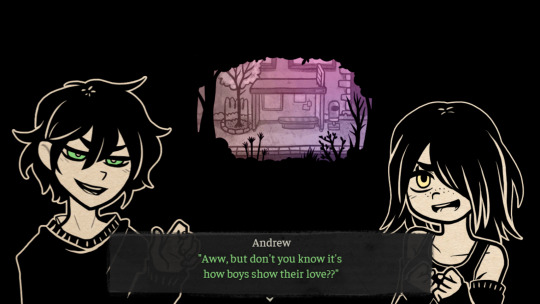
Hm.
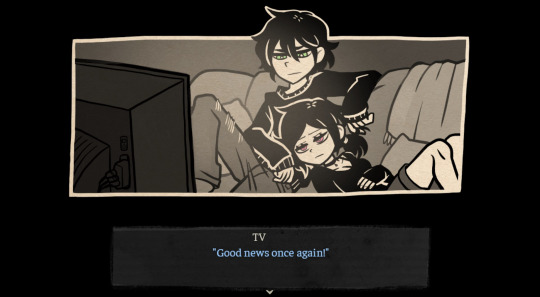
Hm.
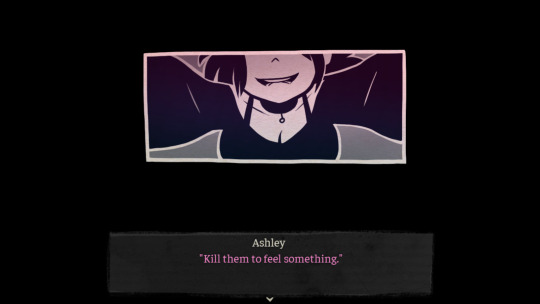
This is part of a dream.
I’ll be honest there is a lot and like, I encourage and invite you to go back over the game yourself if you find yourself disagreeing. I think the big clincher is that, given our premise that characterisation isn’t retroactively altered is… I’ll be honest Andrew, this is not what someone who is shocked and disgusted by the thought of sleeping with their sister looks like.
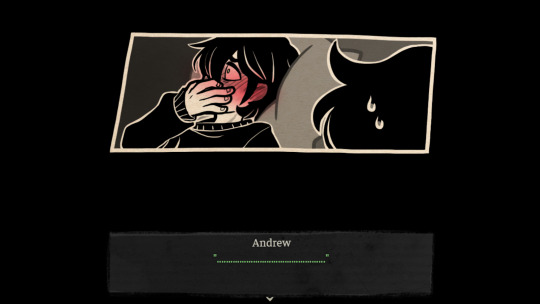
Mmhmm, so mortified.
Moreover for once — he needs Ashley to actually veto him. Usually, she needs to coerce him into things, she needs to get him to give her the okay, through whatever means she has available. In this? It’s the opposite — he’s begging her to say never because he knows that if she doesn’t he won’t be able to stop this future from coming true himself.
If you don’t believe me, I invite you to play the game for yourself — you can see so much more on a second playthrough than you did the first, and I think the game is actually quite heavy-handed with this, once you’re actually looking for this.
Given that, and given his pretty extreme reactions to Ashley’s very transactional attitude to sex — another thing I could talk about but I would prefer this stay below 40 pages — it feels that he needs Ashley to be his but he doesn’t want to be exclusively hers. At least, not in Decay, and perhaps not in Burial, either.
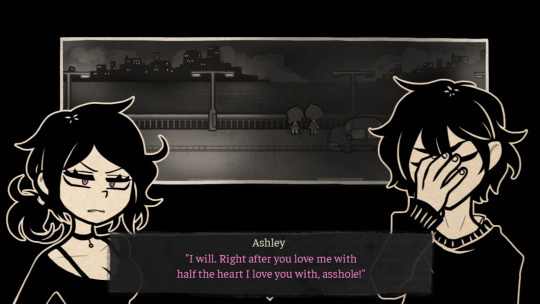
This is from Decay, and from a certain perspective, she’s not wrong.
If this rambling has sparked any neurons, I hope it’s this one:
Who’s really in control here? Who has agency, and when? I hope to hear your thoughts before the next time I get around to this. Until then…

Fin.
Closing Thoughts
I need to wrap this up because we are already over thirty pages long, but…
Wow, what a game, these two really are just, the Worst People Alive making each other worse as they circle the drain and Andrew is just, possibly one of the most fascinating characters I’ve ever seen, he’s so awful and there’s so many layers that I just, struggled to articulate or fit into this five thousand word long essay it could have been four times this long if I’d had the energy. Don’t get me wrong, Ashley is my favourite but as a good friend put it, I want to dissect Andrew in a lab.
I have so many thoughts on this game, it has activated my neurons like no game has before. I could talk about agency, culpability, gender roles, the impact that the game’s near-absolute moral scepticism has upon the player when you attempt to morally interrogate it and even more stuff, honestly. We’ll see how much feedback and how many responses I get because, ultimately, I write these to be seen. If I wanted to just develop my brainworms in peace, I’d stick to Discord.
One thing that I really did need to touch on but this was just getting way too long so I’l leave it here — isn’t it interesting that the most cheerful ending, the most upbeat one is the most monstrous by our own standards? The siblings revel and find an enormous amount of humour in the murder and cannibalism of their parents, while we’re shown that the path that they’re on will lead to them ending up in bed together.
Meanwhile, Decay, where Andrew hates his sister and himself and wants them both dead as, honestly, most people would consider the ‘moral’ thing to do in his situation is… miserable. It’s bleak, it’s deeply uncomfortable and emotionally ravaging.
But- here’s that last thing. When the game tells you the siblings are bad it’s always in the context of society, or the world being better off without them. What do the siblings owe that society? They were raised without care or affection — the parents are another thing I wish I’d been able to cover here — and given the bare minimum to survive. If they’d acted as society wished and expected them to do in Episode 1, they’d have been left to die and used as literal meat in the organ trade.
The comparison to farm animals raised for slaughter seems obvious. (You heard it here first, the message of The Coffin of Andy and Leyley is to eat vegetarian!)
And honestly, they’ve charmed me. If being fucked up little monsters is what makes them happy then, well.
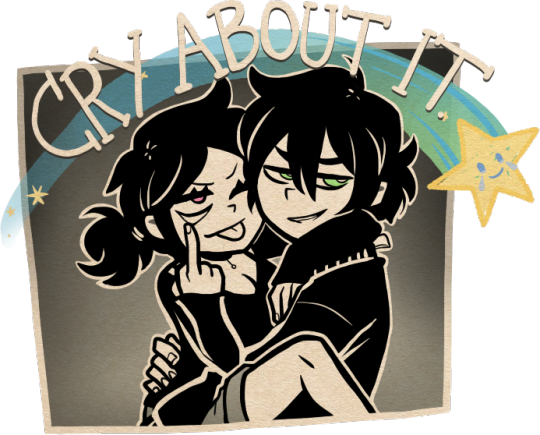
Love that for them, really.
This post is uh, extremely normal I swear
So hello yes I am absolutely On My Bullshit regarding my new favourite game.
That’s right, it’s the cannibal incest game, The Coffin of Andy and Leyley. And I’m here to shove five thousand words of pretentious analysis down your throat because, and I do not exaggerate, I think it is one of, if not the best written game I have ever played. And I have played a lot of games, including Baldur’s Gate 3, Final Fantasy XIV and Undertale, to name a few narrative luminaries to come to mind.
That wordcount is not an exaggeration. My brainworms are extremely powerful and now you can share them with me as I walk you through my insane skyscraper of inference-driven analysis.
Or you can click away. I really wouldn’t blame you, it’s quite a lot.
Content Warnings: …Yes?
(To drop the bit for a moment, The Coffin of Andy and Leyley covers extremely disturbing material and challenges you to examine aspects of living in this world that many have taken for granted all their life, it is not a comfortable game, this will cover similar topics and will often echo the game’s unremitting scepticism on basic principles of society and humanity and you should look after yourself first. My Content Warning is framed as a joke, but it’s also quite real in that the game is designed to make you uncomfortable and there’s no shame in that not being for you.)
This was originally posted on and formatted for Sufficient Velocity, and you can probably more easily read and discuss it with me here.
With that said, let’s dig in. I have had to split this into multiple posts because tumblr will only allow so many images.
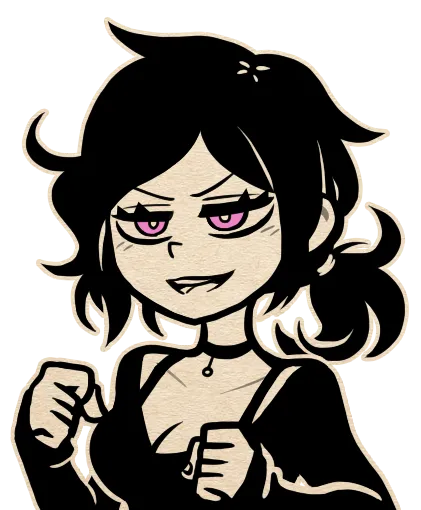
She’s excited, are you?
It’s All About Ashley
It really is, isn’t it? I mean, for approximately eighty percent of the total game as currently released and the entirety of Episode 1, you’re in control of Ashley, just as she’s in control of her and Andrew’s relationship for 80% of the game, up until the various ending sequences where it begins to slip. The only other characters who really matter at all in and of themselves are Andrew and her mother — and the former is under her thumb, and she eats the latter. It’s all about Ashley. Even her obsession with Andrew is, ultimately, about Ashley.
But who is Ashley? What is Ashley? Why is Ashley, even? Let’s take a look.
Ashley as presented to us in Episode 1 is very straightforward, so let’s list off the traits we’re given — she is malicious, she is fearless, she lacks empathy, she doesn’t have anything resembling a conscience, she demands Andrew belong to her and her alone, she has him at her beck and call.
In Episode 2, we’re ostensibly shown how she has him at her beck and call— she leverages the threat of reporting Nina’s death over him and had him swear to be with her forever. We’re shown that even as a child she was “just, like that” — but as a child, she hadn’t learnt to live with it yet, to laugh at the farce of it all.
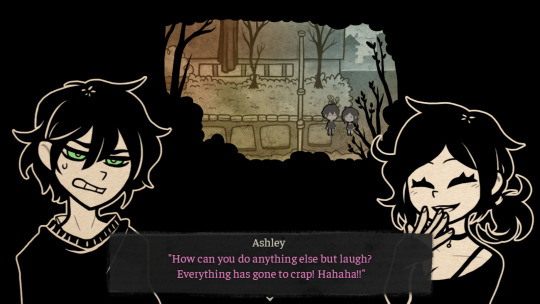
Yeah, exactly like that!
And she does this throughout Episode 1 — The Coffin of Andy and Leyley is a remarkably silly game much of the time, finding moments of absurdity and levity against a backdrop blacker than pitch — and most of the time, your internal narration is coming from Ashley and the jokes will not-infrequently come at her own expense.
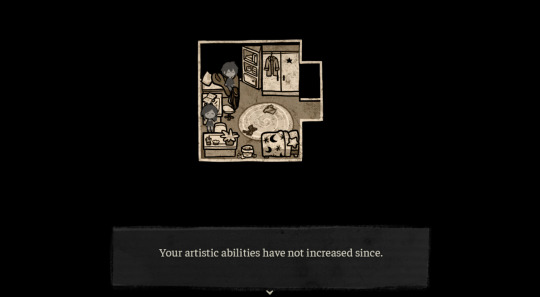
She will later get negged by her human sacrifice for her poor ritual circle drawing
Her reaction to being told that her soul is as dark and viscous as tar is “You guess you already knew that” — it’s confirmation to her, not new information. Ashley knows who she is. But who taught her this? There’s layers to this, nothing in this game is as simple and straightforward as it appears at first sight, which is why I’ve been obsessing over it for days.
While it’s common in fiction, the truth of the matter is, most ‘bad people’ really do think they’re good people. But Ashley has never once thought of herself as a good person — or perhaps better put as a person worthy of love — as we learn across Episodes 1 & 2, with our flashbacks to Andy and Leyley and the VERY VERY QUIET!!!

I really wish I had space in this essay to talk about this, but I’d like to touch on these being traits usually more easily forgiven in young boys than young girls at some point.
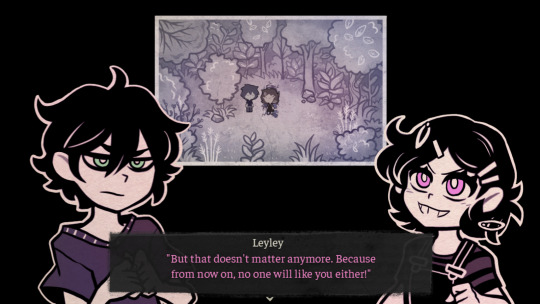
If she removes all other options, only then can she expect him to like her.
This is something that is echoed in the modern day — her seeming self-assurance is easily shaken and she reaches out to the world — usually Andrew — to affirm and validate her, soothing her insecurities, using any tool she deems necessary. Even when her life is on the line when Andrew has her by the throat at the climax of Episode 1, the only ‘compelling reason’ she can give Andrew to not kill her is her ability to soothe his nightmares. When he tells her there are sleeping pills for that…
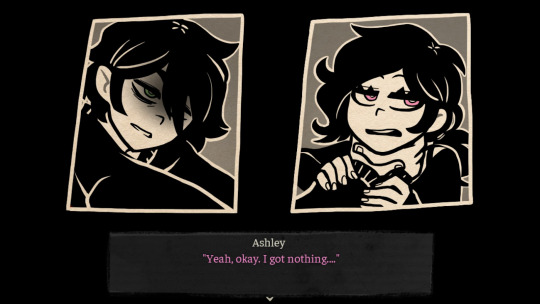
Most people would have a bit more to argue for their existence.
While she, unlike Andrew, acknowledges having had friends before the quarantine… you know she’s got a point that they didn’t even bother to answer her calls, that was clearly not something the state was interfering with given Andrew’s calls with his mother and his girlfriend, and given her general demeanour it’s not hard to imagine that… they weren’t ever very close. When we see her and Nina talk in the infamous ‘box scene’, it’s clear that Nina doesn’t like her very much, despite Andrew’s assessment of Nina as being one of Ashley’s friends.
We see further support for her general lack of companionship in her dream sequence in the Burial route — Leyley and Leyley Alone. No matter what you do, you can’t place the pink plushy at the family table, the flowers won’t bloom if you give the Julia and Nina plushies her own as a companion instead of Andrew’s — and if you’re bold enough to go for the ‘incest route’, in the ‘Love’ room you see that no one ever looks happy to be with her in the childlike depictions of her history, nor is she happy in turn, save for when she’s with Andrew. In a bit of heavy-handed metaphor, the player then overwrites all of these tense, upset, hard moments with Andrew, having him fill in for everyone else in life — and happy with her.
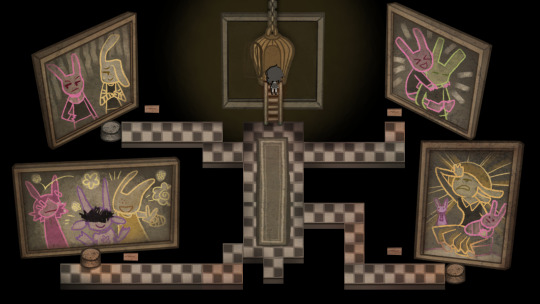
Once Upon A Lousy Life…
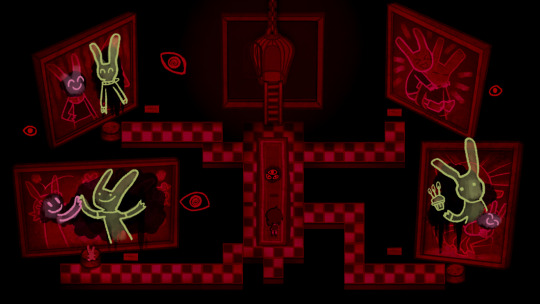
THE END
And that’s why she needs him to affirm her, because no one else ever has and no one else ever will. It’s even included in their comic beats — when the siblings are getting along well, they’ll often play a game where Andrew dramatically overpraises Ashley while she demands more; it’s a comedic bit but I mean — it really does matter to her!
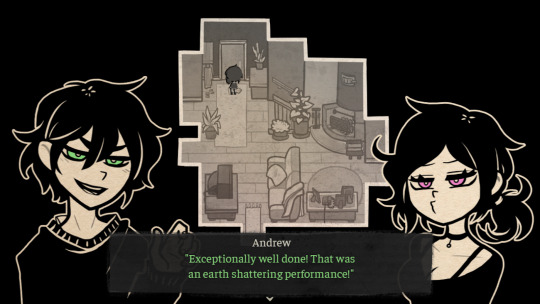
For the record, she opened a door. She gets a little heart in a speech bubble after this exchange.
We have a great example of this dynamic, that of insecurity and affirmation, in Episode 1, after Andrew has killed for her, butchered for her, his girlfriend broke up with her, he’s seemingly thrown his entire life away for her… she’s still insecure over her relationship with him, she’s uncertain of her control and she needs him to reaffirm it for her.
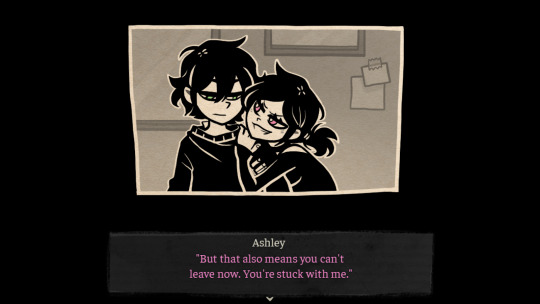
This is her victory, surely?
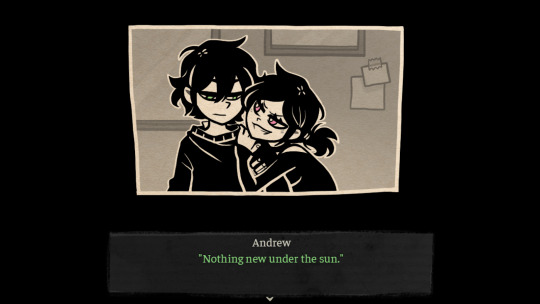
Andrew affirms her once, with his usual dead-eyed look.
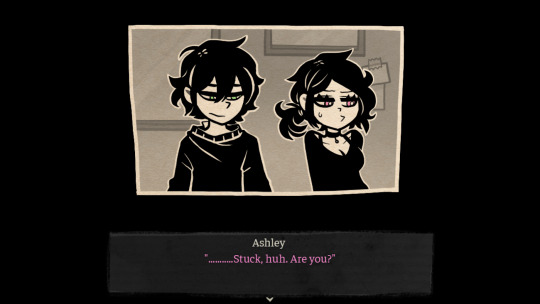
But she's still not so sure.
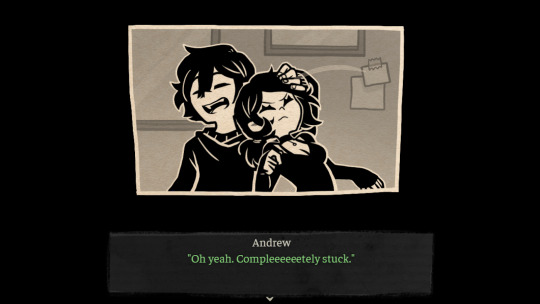
He actively reaches out to affirm her again with cheer.
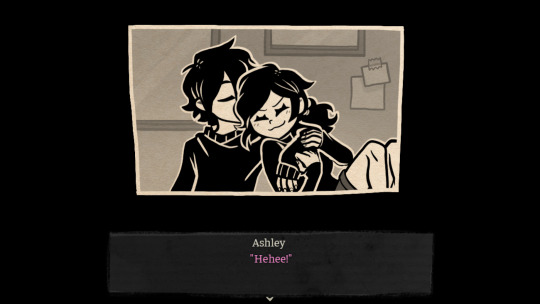
Look how happy she is!
While it’s most obvious and clear cut here, it’s hardly the only case. Let’s look back to the aftermath of Andy and Leyley and the VERY VERY QUIET!!! (I’m not using the other name). Leyley is, after similarly extreme acts — he murdered a girl and hid her body for her — convinced Andy doesn’t like her and she needs this leverage to keep him around, to meet her basic needs for survival. Because that’s what this is — she receives no care of affection elsewhere, so she forces it out of the only source she sees available through the means she sees as necessary.
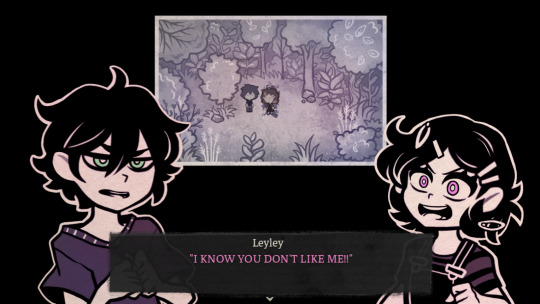
I really hope we see some of their earlier childhood in Episode 3
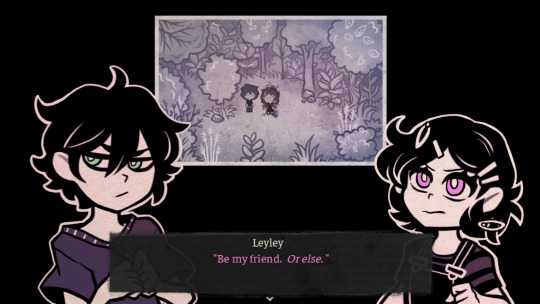
What exactly made her like this? Was it just neglect, or something more specific…
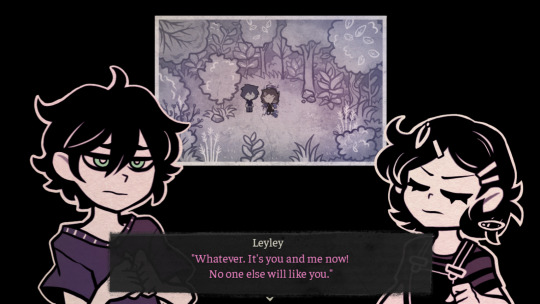
She needs this to be the case because otherwise she doesn’t believe he’d stay.
This pattern repeats throughout — Ashley’s insecurities are hit on and she reaches out to Andy to affirm that she is not alone, and she will use any and every tool to exploit her ostensible control over him and force him to be what she needs him to be — and as long as she has that, as long as she is everything to him and it’s not possible for him to leave, she’s happy. As long as she thinks he loves her in her very particular, very peculiar view of love, she’s content, come what may. As long as Andy and Leyley are together, they can take on the world.
Let’s talk about that view of love, because there’s always more layers to unpack here I’m only scratching the surface with this essay — Ashley consistently refers to anyone else Andrew may have befriended or spent time with as a whore, a slut, a bitch — highly gendered insults that bring to mind the idea that he’s cheating in some way. But it’s not even about sex — when Andrew mentions that their parents had friends, she accuses them of cheating on each other in the same way!
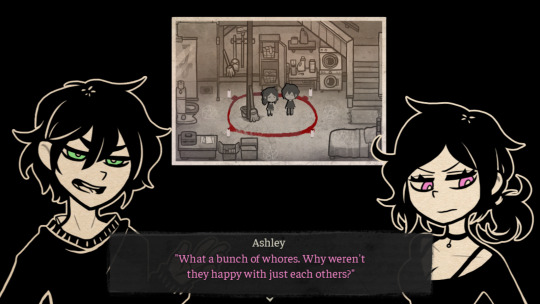
There’s a lot to unpack about Ashley’s view of femininity and the role the patriarchy plays in their relationship.
Any kind of emotional engagement, any kind of commitment, any kind of life outside of your significant other is, to Ashley, cheating. Because that’s what she needs from Andrew, a seeming complete and total commitment, secure in her place as the only thing in his life, because she cannot understand anyone picking her if they have a choice.
This insecurity she has in her relationship is what drives her to empower the trinket — he can’t leave her as long as she can protect him with prophetic dreams, after all. She needs every kind of leverage she can get because until she succeeds in being everything to him, in devouring him so completely she has him in her thrall mind, body and soul she can’t be sure of herself — hell, her dream sequence in Burial has you placing Andrew’s signature green plushy, ‘the best thing in the world’ in a cage far away from anything else.
Ultimately, it really is all about Ashley — even her seeming obsession with Andrew ultimately comes back to her own insecurities. If she is everything to ‘the best thing in the world’, some of that ‘best’ must surely reflect on her!
But that’s enough about the more normal, straightforward and understandable sibling.
That was not a joke.
Andrew’s Rank 100 Deception
The greatest trick the Devil ever pulled was convincing the world that he did not exist.
Let me explain.
You might have noticed that in the previous section I often use language such as ‘ostensibly’ or ‘seemingly’ to describe Andy and Leyley’s relationship, and there’s a good reason for that. From the beginning of the game through to its end, Andrew is lying to you, the player, without ever falsely representing or misinforming you about events that occurred.
The common, or obvious ‘initial take’ on Andrew as presented in Episode 1 is fairly straightforward. The game primes you to think this way, it frames things and strings reveals just right so as to make it very easy to overlook the incongruities it introduces in Episode 2. He’s a victim. Plain and simple, Ashley is his abuser and he is her victim and would be fine, a normal albeit kinda depressed guy without her.

It really is not a difficult conclusion to draw
You can go all the way through the game, have him try to accept his mother’s olive branch and enter the Decay route as a method for him to finally actualise his desire to get out from Ashley’s thumb and it makes sense, it’s a reasonable way for the story to go, given his character.
You see him this way because the game primes you in Episode 1 to view their relationship like Andrew does — he’s lying. He’s lying to himself, he’s lying to Ashley and he’s so good at it — Deception Rank 100 — he even lies to you. Without misrepresenting a single event or otherwise misleading you directly, the game gets you to buy into his preferred self-perception. Nina? Ashley. Julia? Ashley. The murders they commit in the course of the game? Ashley, Ashley, Ashley, it’s not his fault he’s not to blame he’s just a doormat at the beck and call of his demonic sister.
But he wants to be there. From the very outset, the very first puzzle, that’s made clear. Does anyone else remember this exchange, from right at the beginning of the game?

Ashley wants to investigate the music!
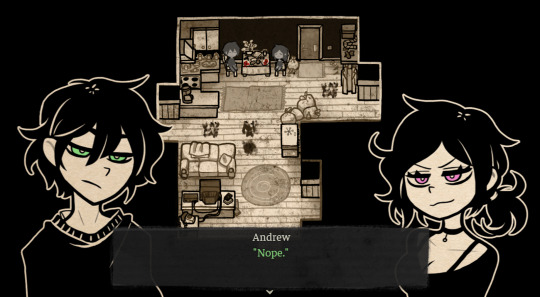
Andrew disapproves…
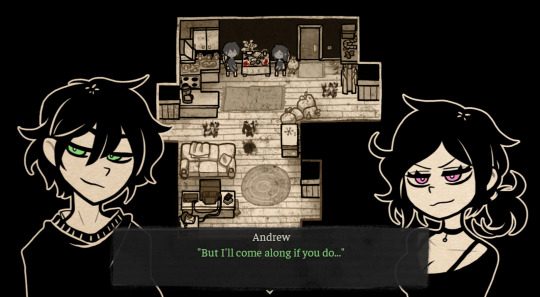
…Or does he?!
Like. Listen. Okay. You do not frown when saying ‘Nope’ and then smile when saying that you’ll instead tag along if they do it if your heart is at all in the no. That’s not an objection, that’s using Ashley as his excuse. Especially if you immediately throw her the balcony key that she could not possibly have gotten from you by force (more on Andrew’s ability to use force later).
This is the very first time you control both characters together with Andrew following Ashley instead of off on his own, the first adventure, the first puzzle!
But put a pin in that for now, let’s talk about his initial framing in Episode 2 first. Episode 1 has set us up to, generally speaking, believe the superficial framing of the siblings as portrayed in its promotional art:

The question that we then ask, right at the heart of it is… why is he a doormat? We explore this in his dream sequence in Episode 2, which does make it clear that the boy’s not okay but— it’s real easy, given the priming from Episode 1 to make you think that he’s the one with the originally functional moral compass, to think that that him being fucked up is damage done to him by Nina’s death and being bound to Ashley for his entire life. She corrupted him.
But, well, is that the case?
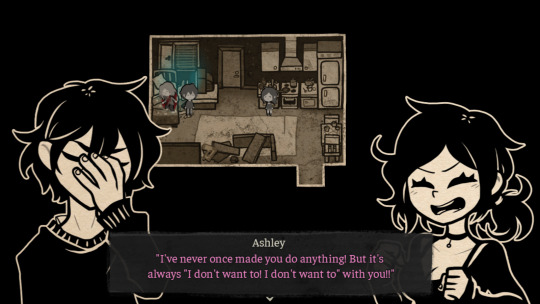
You're primed to ignore this as manipulation (which it is) but the best manipulation has some truth to it.
Precisely two things spur Andrew to action in the entire game, consistently — they are the fear of consequences and Ashley. And the first incident of that fear, the very first time we’re shown his seeming moral compass as a kid — the first time it’s really hammered home that it’s a fear of consequences rather than any true moral qualms is after Nina’s death. And why does he fear consequences here?
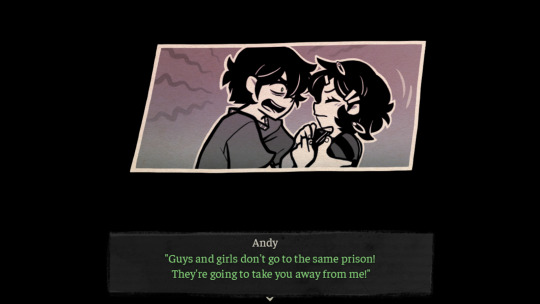
……
The ‘natural’ read that many take away from this sequence, particularly those who have only played Decay, is that Ashley browbeat him into doing this against his will, using emotional blackmail to overwhelm his objections, and then used the event itself to bind him to her forever as her personal doormat.
In a strict sense, this is true. But this doesn’t match up with the details, something the game uses shock to encourage you to overlook. That outburst is before any kind of threat has been made, and absolutely nothing either of them say anything about it being morally bad until Ashley weaponises ‘you’re a bad person’ against Andrew — morality didn’t seem to enter his mind or the equation at all until Ashley brought it up. More than that, his greatest fear and driving motivation even prior to that is, as shown above, being taken away from Ashley.
She, of course, recognises this and uses it against him. But she never needed to, it didn’t change anything about Andrew’s attachment to her, it was there to address her own insecurities.

Just like to touch on how a lot of his affirmations are preceded by him confirming her insecurities.
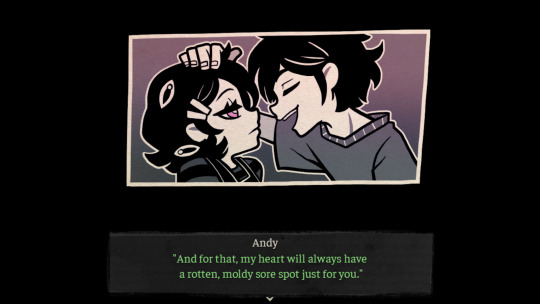
I adore this phrasing
There’s a second prong to this as well, to the question of ‘who really calls the shots here’ because — Andrew can, at any stage, apply an ‘ultimate veto’ of physical violence. The game is very clear to the player that that is on the table — even when they were children, when Andy swears their blood oath, he briefly considers killing her — and take note of how he ultimately got a ‘winning’ condition out of her by not specifying there wouldn’t be others and she is forced to accept that, there. Even outside of their most serious confrontations, Ashley is portrayed as having to convince, manipulate or otherwise coerce Andrew into going along with her schemes — she really can’t make him do anything, she doesn’t have the supremacy in violence and, to a lesser extent, capability that would allow her to.
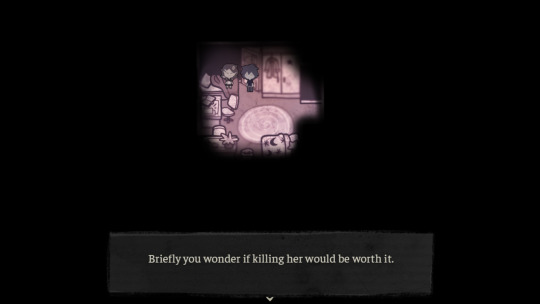
Andrew, you are like ten years old.
The truth of the matter is, Ashley can only make Andrew do anything because he lets her. I don’t mean in the sense that I’m saying abuse victims let their abusers emotionally abuse them, I mean in the sense that he is clearly considering his options on the table and choosing to discard those that could stop her, or bring an end to any of this. He needs her.
But it’s true that he hates her, too. He has to hate her, because if he doesn’t hate her, if he isn’t forced to have done this, that means… he’s responsible. And nothing, at the start of the story, is as important to Andrew as avoiding the consequences of his own actions, not even Ashley. By the midpoint, he loves her, he hates her, he can’t live without her, he wants to kill her — by the end… well, that depends if you’re on Decay or Burial, but more on that in a bit.
A great scene to study for this dynamic is the climax of Episode 1, when Andrew grabs Ashley by the throat and considers strangling her to death. She’s pushed him too far with hurtful words and assault, and he’s seemingly had enough.
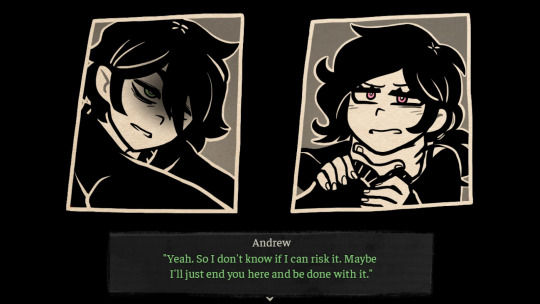
It’s still framed as a question of risk, of consequences happening to him.
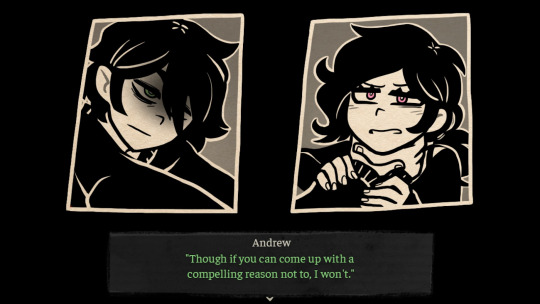
Like, this is not the usual behaviour of someone who’s been pushed past their breaking point.
He tells Ashley that he wants to kill her, because she’s just going to throw another fit and that’s a risk to him. She is… not framed as being able to fight back (she does have a gun here, and more on that in a later essay, maybe). He’s so calculated in how he approaches his use of violence here, which isn’t at all what you’d expect of someone about to commit a crime of passion… but it’s very easy to overlook because of the abuser/victim narrative that the player fits his behaviour into the narrative that the game primes them to accept, brushing incongruities under the carpet.
At the start of Episode 2, we get to control Andrew for the first time, and the first obvious holes in his cover start to show. Some of this is optional — you only learn that he’s been faking having nightmares in order to share a bed with Ashley if you choose to go back into the motel room and check the bed, for example — but not all of it.
----
#the coffin of andy and leyley#tcoaal#I could have written so much more#essay#analysis#very long post
1K notes
·
View notes
Text
This post is uh, extremely normal I swear
So hello yes I am absolutely On My Bullshit regarding my new favourite game.
That’s right, it’s the cannibal incest game, The Coffin of Andy and Leyley. And I’m here to shove five thousand words of pretentious analysis down your throat because, and I do not exaggerate, I think it is one of, if not the best written game I have ever played. And I have played a lot of games, including Baldur’s Gate 3, Final Fantasy XIV and Undertale, to name a few narrative luminaries to come to mind.
That wordcount is not an exaggeration. My brainworms are extremely powerful and now you can share them with me as I walk you through my insane skyscraper of inference-driven analysis.
Or you can click away. I really wouldn’t blame you, it’s quite a lot.
Content Warnings: …Yes?
(To drop the bit for a moment, The Coffin of Andy and Leyley covers extremely disturbing material and challenges you to examine aspects of living in this world that many have taken for granted all their life, it is not a comfortable game, this will cover similar topics and will often echo the game’s unremitting scepticism on basic principles of society and humanity and you should look after yourself first. My Content Warning is framed as a joke, but it’s also quite real in that the game is designed to make you uncomfortable and there’s no shame in that not being for you.)
This was originally posted on and formatted for Sufficient Velocity, and you can probably more easily read and discuss it with me here.
With that said, let’s dig in. I have had to split this into multiple posts because tumblr will only allow so many images. There will be spoilers for all endings.

She’s excited, are you?
It’s All About Ashley
It really is, isn’t it? I mean, for approximately eighty percent of the total game as currently released and the entirety of Episode 1, you’re in control of Ashley, just as she’s in control of her and Andrew’s relationship for 80% of the game, up until the various ending sequences where it begins to slip. The only other characters who really matter at all in and of themselves are Andrew and her mother — and the former is under her thumb, and she eats the latter. It’s all about Ashley. Even her obsession with Andrew is, ultimately, about Ashley.
But who is Ashley? What is Ashley? Why is Ashley, even? Let’s take a look.
Ashley as presented to us in Episode 1 is very straightforward, so let’s list off the traits we’re given — she is malicious, she is fearless, she lacks empathy, she doesn’t have anything resembling a conscience, she demands Andrew belong to her and her alone, she has him at her beck and call.
In Episode 2, we’re ostensibly shown how she has him at her beck and call— she leverages the threat of reporting Nina’s death over him and had him swear to be with her forever. We’re shown that even as a child she was “just, like that” — but as a child, she hadn’t learnt to live with it yet, to laugh at the farce of it all.

Yeah, exactly like that!
And she does this throughout Episode 1 — The Coffin of Andy and Leyley is a remarkably silly game much of the time, finding moments of absurdity and levity against a backdrop blacker than pitch — and most of the time, your internal narration is coming from Ashley and the jokes will not-infrequently come at her own expense.

She will later get negged by her human sacrifice for her poor ritual circle drawing
Her reaction to being told that her soul is as dark and viscous as tar is “You guess you already knew that” — it’s confirmation to her, not new information. Ashley knows who she is. But who taught her this? There’s layers to this, nothing in this game is as simple and straightforward as it appears at first sight, which is why I’ve been obsessing over it for days.
While it’s common in fiction, the truth of the matter is, most ‘bad people’ really do think they’re good people. But Ashley has never once thought of herself as a good person — or perhaps better put as a person worthy of love — as we learn across Episodes 1 & 2, with our flashbacks to Andy and Leyley and the VERY VERY QUIET!!!

I really wish I had space in this essay to talk about this, but I’d like to touch on these being traits usually more easily forgiven in young boys than young girls at some point.

If she removes all other options, only then can she expect him to like her.
This is something that is echoed in the modern day — her seeming self-assurance is easily shaken and she reaches out to the world — usually Andrew — to affirm and validate her, soothing her insecurities, using any tool she deems necessary. Even when her life is on the line when Andrew has her by the throat at the climax of Episode 1, the only ‘compelling reason’ she can give Andrew to not kill her is her ability to soothe his nightmares. When he tells her there are sleeping pills for that…

Most people would have a bit more to argue for their existence.
While she, unlike Andrew, acknowledges having had friends before the quarantine… you know she’s got a point that they didn’t even bother to answer her calls, that was clearly not something the state was interfering with given Andrew’s calls with his mother and his girlfriend, and given her general demeanour it’s not hard to imagine that… they weren’t ever very close. When we see her and Nina talk in the infamous ‘box scene’, it’s clear that Nina doesn’t like her very much, despite Andrew’s assessment of Nina as being one of Ashley’s friends.
We see further support for her general lack of companionship in her dream sequence in the Burial route — Leyley and Leyley Alone. No matter what you do, you can’t place the pink plushy at the family table, the flowers won’t bloom if you give the Julia and Nina plushies her own as a companion instead of Andrew’s — and if you’re bold enough to go for the ‘incest route’, in the ‘Love’ room you see that no one ever looks happy to be with her in the childlike depictions of her history, nor is she happy in turn, save for when she’s with Andrew. In a bit of heavy-handed metaphor, the player then overwrites all of these tense, upset, hard moments with Andrew, having him fill in for everyone else in life — and happy with her.

Once Upon A Lousy Life…

THE END
And that’s why she needs him to affirm her, because no one else ever has and no one else ever will. It’s even included in their comic beats — when the siblings are getting along well, they’ll often play a game where Andrew dramatically overpraises Ashley while she demands more; it’s a comedic bit but I mean — it really does matter to her!

For the record, she opened a door. She gets a little heart in a speech bubble after this exchange.
We have a great example of this dynamic, that of insecurity and affirmation, in Episode 1, after Andrew has killed for her, butchered for her, his girlfriend broke up with her, he’s seemingly thrown his entire life away for her… she’s still insecure over her relationship with him, she’s uncertain of her control and she needs him to reaffirm it for her.

This is her victory, surely?

Andrew affirms her once, with his usual dead-eyed look.

But she's still not so sure.

He actively reaches out to affirm her again with cheer.

Look how happy she is!
While it’s most obvious and clear cut here, it’s hardly the only case. Let’s look back to the aftermath of Andy and Leyley and the VERY VERY QUIET!!! (I’m not using the other name). Leyley is, after similarly extreme acts — he murdered a girl and hid her body for her — convinced Andy doesn’t like her and she needs this leverage to keep him around, to meet her basic needs for survival. Because that’s what this is — she receives no care of affection elsewhere, so she forces it out of the only source she sees available through the means she sees as necessary.

I really hope we see some of their earlier childhood in Episode 3

What exactly made her like this? Was it just neglect, or something more specific…

She needs this to be the case because otherwise she doesn’t believe he’d stay.
This pattern repeats throughout — Ashley’s insecurities are hit on and she reaches out to Andy to affirm that she is not alone, and she will use any and every tool to exploit her ostensible control over him and force him to be what she needs him to be — and as long as she has that, as long as she is everything to him and it’s not possible for him to leave, she’s happy. As long as she thinks he loves her in her very particular, very peculiar view of love, she’s content, come what may. As long as Andy and Leyley are together, they can take on the world.
Let’s talk about that view of love, because there’s always more layers to unpack here I’m only scratching the surface with this essay — Ashley consistently refers to anyone else Andrew may have befriended or spent time with as a whore, a slut, a bitch — highly gendered insults that bring to mind the idea that he’s cheating in some way. But it’s not even about sex — when Andrew mentions that their parents had friends, she accuses them of cheating on each other in the same way!

There’s a lot to unpack about Ashley’s view of femininity and the role the patriarchy plays in their relationship.
Any kind of emotional engagement, any kind of commitment, any kind of life outside of your significant other is, to Ashley, cheating. Because that’s what she needs from Andrew, a seeming complete and total commitment, secure in her place as the only thing in his life, because she cannot understand anyone picking her if they have a choice.
This insecurity she has in her relationship is what drives her to empower the trinket — he can’t leave her as long as she can protect him with prophetic dreams, after all. She needs every kind of leverage she can get because until she succeeds in being everything to him, in devouring him so completely she has him in her thrall mind, body and soul she can’t be sure of herself — hell, her dream sequence in Burial has you placing Andrew’s signature green plushy, ‘the best thing in the world’ in a cage far away from anything else.
Ultimately, it really is all about Ashley — even her seeming obsession with Andrew ultimately comes back to her own insecurities. If she is everything to ‘the best thing in the world’, some of that ‘best’ must surely reflect on her!
But that’s enough about the more normal, straightforward and understandable sibling.
That was not a joke.
Andrew’s Rank 100 Deception
The greatest trick the Devil ever pulled was convincing the world that he did not exist.
Let me explain.
You might have noticed that in the previous section I often use language such as ‘ostensibly’ or ‘seemingly’ to describe Andy and Leyley’s relationship, and there’s a good reason for that. From the beginning of the game through to its end, Andrew is lying to you, the player, without ever falsely representing or misinforming you about events that occurred.
The common, or obvious ‘initial take’ on Andrew as presented in Episode 1 is fairly straightforward. The game primes you to think this way, it frames things and strings reveals just right so as to make it very easy to overlook the incongruities it introduces in Episode 2. He’s a victim. Plain and simple, Ashley is his abuser and he is her victim and would be fine, a normal albeit kinda depressed guy without her.

It really is not a difficult conclusion to draw
You can go all the way through the game, have him try to accept his mother’s olive branch and enter the Decay route as a method for him to finally actualise his desire to get out from Ashley’s thumb and it makes sense, it’s a reasonable way for the story to go, given his character.
You see him this way because the game primes you in Episode 1 to view their relationship like Andrew does — he’s lying. He’s lying to himself, he’s lying to Ashley and he’s so good at it — Deception Rank 100 — he even lies to you. Without misrepresenting a single event or otherwise misleading you directly, the game gets you to buy into his preferred self-perception. Nina? Ashley. Julia? Ashley. The murders they commit in the course of the game? Ashley, Ashley, Ashley, it’s not his fault he’s not to blame he’s just a doormat at the beck and call of his demonic sister.
But he wants to be there. From the very outset, the very first puzzle, that’s made clear. Does anyone else remember this exchange, from right at the beginning of the game?

Ashley wants to investigate the music!

Andrew disapproves…

…Or does he?!
Like. Listen. Okay. You do not frown when saying ‘Nope’ and then smile when saying that you’ll instead tag along if they do it if your heart is at all in the no. That’s not an objection, that’s using Ashley as his excuse. Especially if you immediately throw her the balcony key that she could not possibly have gotten from you by force (more on Andrew’s ability to use force later).
This is the very first time you control both characters together with Andrew following Ashley instead of off on his own, the first adventure, the first puzzle!
But put a pin in that for now, let’s talk about his initial framing in Episode 2 first. Episode 1 has set us up to, generally speaking, believe the superficial framing of the siblings as portrayed in its promotional art:

The question that we then ask, right at the heart of it is… why is he a doormat? We explore this in his dream sequence in Episode 2, which does make it clear that the boy’s not okay but— it’s real easy, given the priming from Episode 1 to make you think that he’s the one with the originally functional moral compass, to think that that him being fucked up is damage done to him by Nina’s death and being bound to Ashley for his entire life. She corrupted him.
But, well, is that the case?

You're primed to ignore this as manipulation (which it is) but the best manipulation has some truth to it.
Precisely two things spur Andrew to action in the entire game, consistently — they are the fear of consequences and Ashley. And the first incident of that fear, the very first time we’re shown his seeming moral compass as a kid — the first time it’s really hammered home that it’s a fear of consequences rather than any true moral qualms is after Nina’s death. And why does he fear consequences here?

……
The ‘natural’ read that many take away from this sequence, particularly those who have only played Decay, is that Ashley browbeat him into doing this against his will, using emotional blackmail to overwhelm his objections, and then used the event itself to bind him to her forever as her personal doormat.
In a strict sense, this is true. But this doesn’t match up with the details, something the game uses shock to encourage you to overlook. That outburst is before any kind of threat has been made, and absolutely nothing either of them say anything about it being morally bad until Ashley weaponises ‘you’re a bad person’ against Andrew — morality didn’t seem to enter his mind or the equation at all until Ashley brought it up. More than that, his greatest fear and driving motivation even prior to that is, as shown above, being taken away from Ashley.
She, of course, recognises this and uses it against him. But she never needed to, it didn’t change anything about Andrew’s attachment to her, it was there to address her own insecurities.

Just like to touch on how a lot of his affirmations are preceded by him confirming her insecurities.

I adore this phrasing
There’s a second prong to this as well, to the question of ‘who really calls the shots here’ because — Andrew can, at any stage, apply an ‘ultimate veto’ of physical violence. The game is very clear to the player that that is on the table — even when they were children, when Andy swears their blood oath, he briefly considers killing her — and take note of how he ultimately got a ‘winning’ condition out of her by not specifying there wouldn’t be others and she is forced to accept that, there. Even outside of their most serious confrontations, Ashley is portrayed as having to convince, manipulate or otherwise coerce Andrew into going along with her schemes — she really can’t make him do anything, she doesn’t have the supremacy in violence and, to a lesser extent, capability that would allow her to.

Andrew, you are like ten years old.
The truth of the matter is, Ashley can only make Andrew do anything because he lets her. I don’t mean in the sense that I’m saying abuse victims let their abusers emotionally abuse them, I mean in the sense that he is clearly considering his options on the table and choosing to discard those that could stop her, or bring an end to any of this. He needs her.
But it’s true that he hates her, too. He has to hate her, because if he doesn’t hate her, if he isn’t forced to have done this, that means… he’s responsible. And nothing, at the start of the story, is as important to Andrew as avoiding the consequences of his own actions, not even Ashley. By the midpoint, he loves her, he hates her, he can’t live without her, he wants to kill her — by the end… well, that depends if you’re on Decay or Burial, but more on that in a bit.
A great scene to study for this dynamic is the climax of Episode 1, when Andrew grabs Ashley by the throat and considers strangling her to death. She’s pushed him too far with hurtful words and assault, and he’s seemingly had enough.

It’s still framed as a question of risk, of consequences happening to him.

Like, this is not the usual behaviour of someone who’s been pushed past their breaking point.
He tells Ashley that he wants to kill her, because she’s just going to throw another fit and that’s a risk to him. She is… not framed as being able to fight back (she does have a gun here, and more on that in a later essay, maybe). He’s so calculated in how he approaches his use of violence here, which isn’t at all what you’d expect of someone about to commit a crime of passion… but it’s very easy to overlook because of the abuser/victim narrative that the player fits his behaviour into the narrative that the game primes them to accept, brushing incongruities under the carpet.
At the start of Episode 2, we get to control Andrew for the first time, and the first obvious holes in his cover start to show. Some of this is optional — you only learn that he’s been faking having nightmares in order to share a bed with Ashley if you choose to go back into the motel room and check the bed, for example — but not all of it.
----(See reblogs for the second half)
1K notes
·
View notes
Text
going absolutely insane thinking about the juxtaposition of the Decay and Burial endings of The Closet of Andy and Leyley — in particular Love, of the Burial endings — and how the most monstrous-by-standard-morals outcome is also by far the most upbeat
#tcooal#the closet of andy and leyley#among other things#the cannibal incest game is an unironic 10/10 and I'm not sure what to do with that#It's been days and I'm still thinking about it what an absolutely cracked narrative#poking at an essay on it that will hopefully see the light of day soon#wrote the most deranged three thousand words of my life trying to explain my experience with trying to morally interrogate it#and that will not see the light of day#but something saner than 'let us examine the space between structure and genesis' hopefully will
19 notes
·
View notes
Text
(SPOILERS) breaking down how obsessed Andrew is w/his sister bc he's a repressed lil liar and I'm going insane
This post got longer than I intended it to
1. He claims they don't spend enough time apart from each other to even begin missing her so he doesn't even know if he would, but just earlier in the game he was apart from her for probs like 30 mins tops to investigates some cultists and guess what???? He was already missing her 😒

2. Says "I thought you grew out of this touchy-feely crap" when Ashley asks for a hug, but earlier when he was cooking dinner, he was the one with the inexplicable urge to "pull this broody bitch into [his] arms and force her to stay until she smiles" 😒
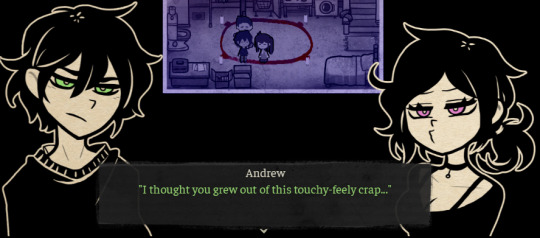
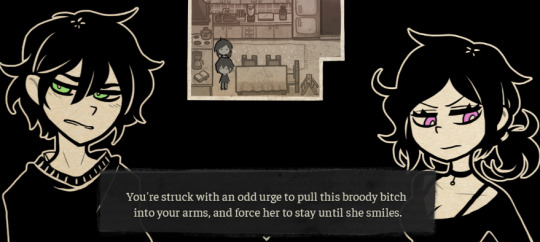
3. Piggy-backing off the last screenshot: WHAT OTHER THOUGHTS, ANDREW??? yOU WERE JUST THINKING ABT HUGGING HER. WHAT DO YOU EVEN MEAN. THESE ARE SIMPLY INNOCENT BROTHERLY THOUGHTS ARE THEY NOT????? 🤨🤨🤨


4. Bro just can't keep his hands off her. And everyone thinks Ashley's the clingy one jeez (lol the way he springs apart from her when Mom catches them is definitely definitelyyyy not worth analyzing. nope. not even when it happens a second time on the couch. nope. nooope)
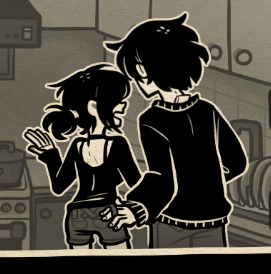
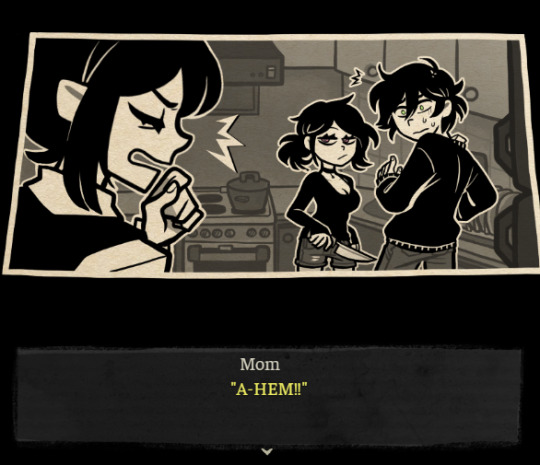
5. What. What is he thinking here. Don't think I don't see those grey lil blush lines. Is this connected to my third point somehow bc like... 🤨😬 Is "Andrew" is gonna start doing and being what "Andy" was too spineless and afraid of doing?? That's what the vow was partly abt right?? Does that include—
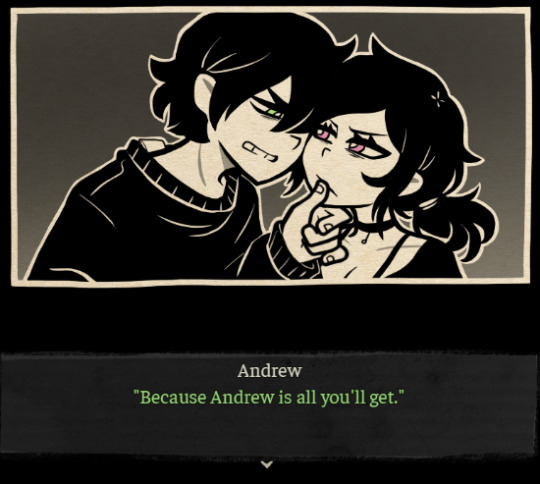
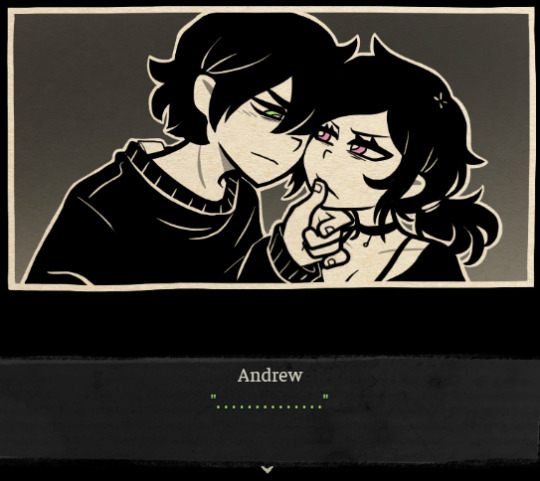
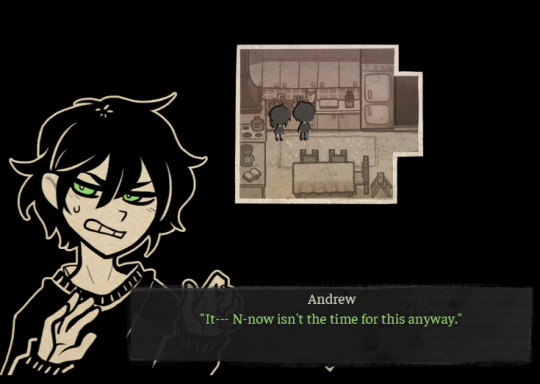
5. WHEWWW BOY that little flashback with his gf has so much baggage in it I just wanna dissect. His girlfriend's tryna have a serious discussion with him abt his weird sister for the sake of bettering their relationship bc she genuinely loves him, but he just gets caught up in fondly talking abt said weird sister instead??
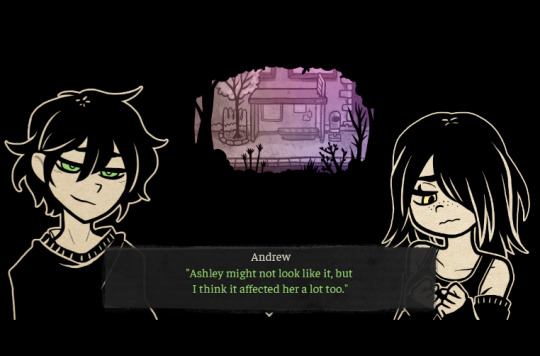
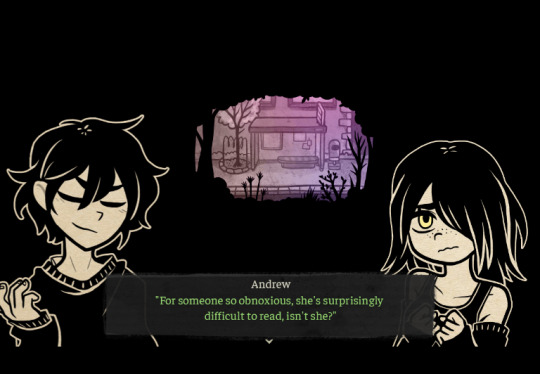
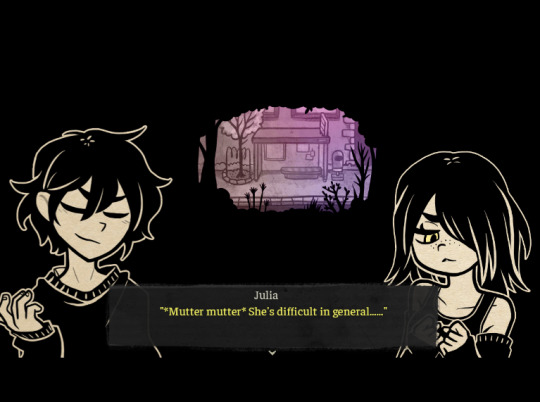
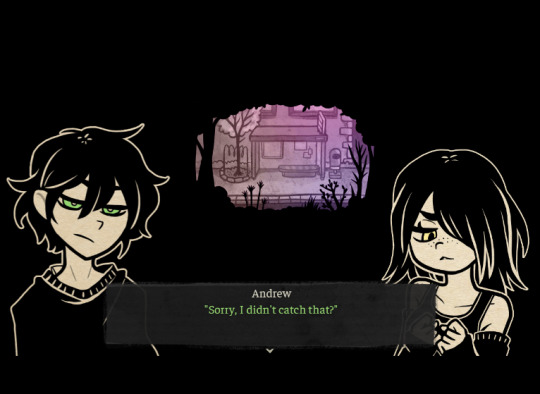
6. He's awfully hesitant abt Ashley learning some independence, bc y'know what?? I think he doesn't really want her to stop relying on him. But what do I know y'know


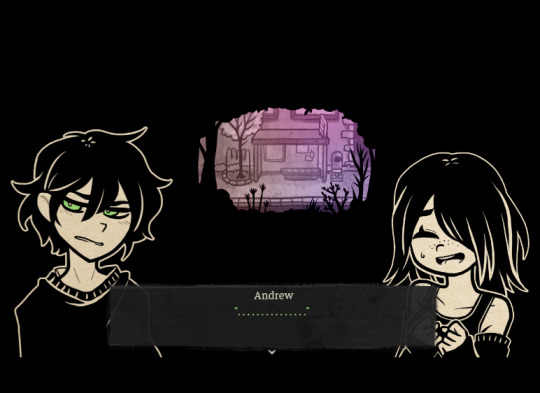
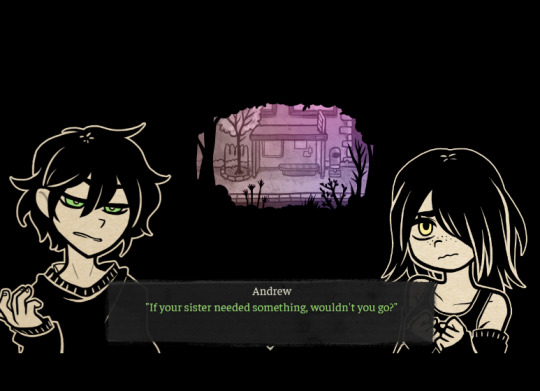
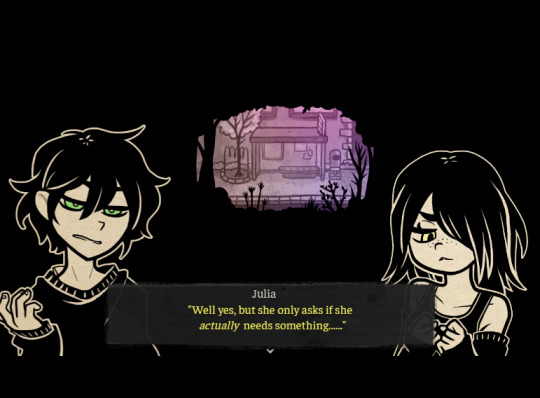
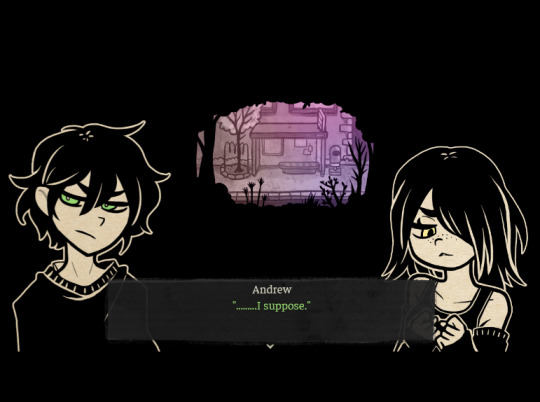
6. Wants his gf to put tie her hair up in a ponytail, then when she refuses bc he'll pull on it, says it's just "how boys express their love". Well. You know who else puts there hair up in a ponytail??? You know who else's hair he's always pulling on and touching???
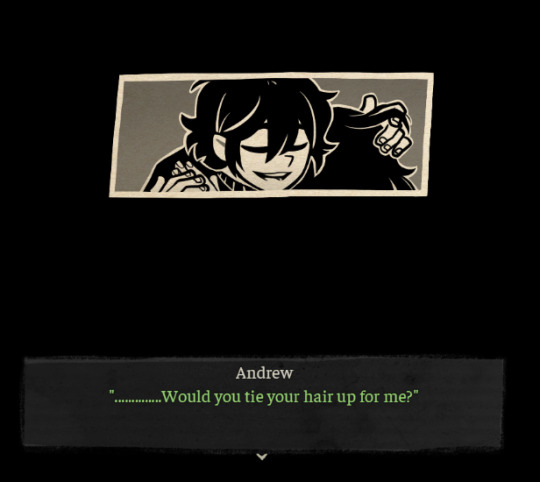
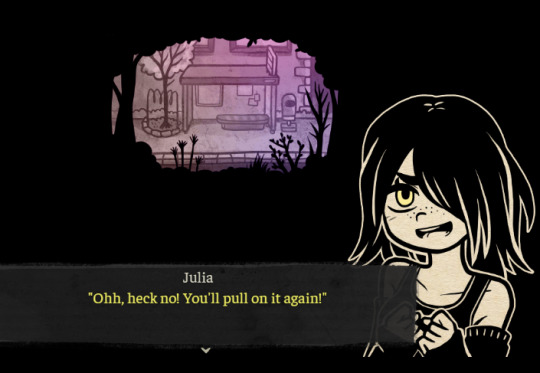
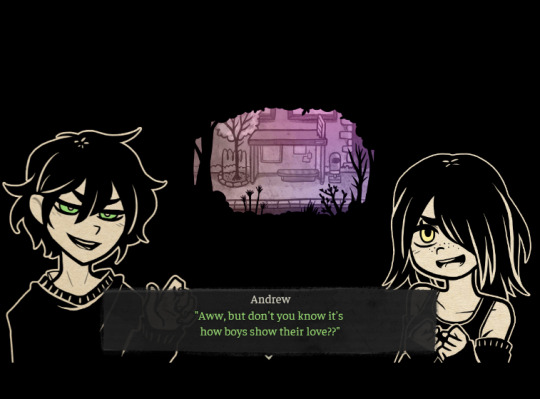
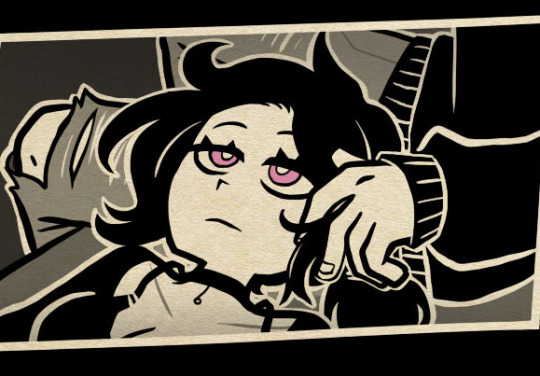
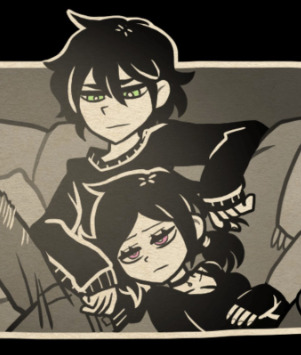
7. The voicemails in his gf's phone left by Ashley are heard by him in his dreams, and his dreams are a construction of his mind utilizing his memories, personal hangups, and knowledge of Ashley. The voicemails irl were left on his gf's phone, and for all we know, he never actually listened to them in person. Bearing this in mind... odds are the things Ashley's saying contain bits of truths he believes within himself, filtered thru her crude, hateful dialogue.
Here. I transcribed one of them...
"DO YOU THINK YOU'RE BETTER THAN ME!? Just because you can fuck him and I can't? You think that's love?! Are you fucking delusional?? Cumdumpsters like you are just that. He will never love you. Not like he loves me. I am the only one. I am everything. I am the secrets you'll never hear. When he lies in bed at night, and when he needs someone to hold on to… It's not you he seeks out. It is me."
8. Claims Ashley's the one with the jealous streak, not him, but I think he's just as bad. The only difference is that Ashley's never given him reason to act on it since all she's ever wanted was him, but at the slightest mention of her gettin it on w/someone else, even as a joke, he gets mad. "OVER MY DEAD BODY!!" he says, when she's jokingly contemplating getting knocked up via the neighbor so an ambulance would come for her. "I wouldn't let them," he says, when she's complaining abt not being pretty enough for the wardens to bang her
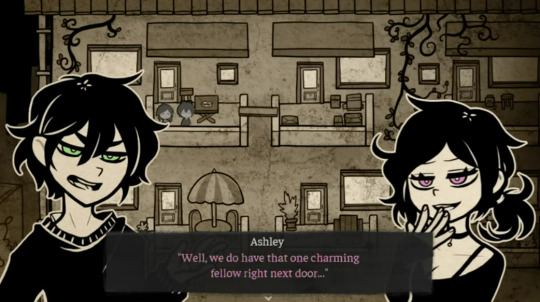
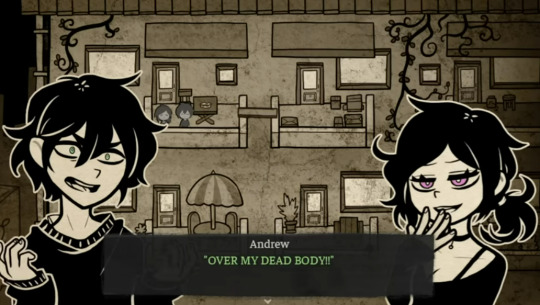
9. Going hand-in-hand with that fact, he's intensely protective of her. Didn't hesitate to cleaver the warden who found her in the closet (probs didn't even BLINK lmaooo he chose VIOLENCE), and when the cake-stealing cultist insulted her just once, he stepped forward just like that
10. In their apt, when they were lying on the floor talking abt jumping off the balcony, he was really caught up in the "romantic" fantasy of them committing a double suicide and dying with their bodies entwined so irreparably by the impact they form one unified corpse "never to be separated!" and they get buried in the same coffin together. UM??? Bro fr thought he was the sane one of the two. That wasn't even true before the cannibalism and demon summoning 😭😭😭
BONUS:
11. This might just be me, but his reaction to seeing the post-sex vision doesn't strike me as someone who's inherently opposed to the idea. Instead of disgusted, he was... flustered?? He acted like she walked in mid-guilty pleasure wet dream. This wasn't a "GROSS THATS INCEST" reaction which is... the most normal reaction to have. That's the face of a man that got CAUGHT bro.
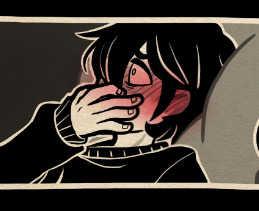
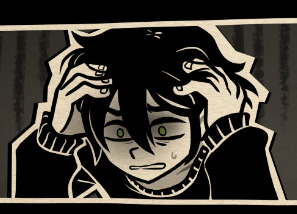
He asks "we're not like that, are we?" and "why are you like this?" and questions the veracity of the vision, but he never actually explicitly denies wanting the vision to happen, more focused on Ashley and her reaction. He buries the elephant under the rug as fast as he can, bc yeah, it struck a landmine, but it probably wasn't a landmine for the reason Ashley thinks it is. I bet the vision just hit a little too close... :P
#tcoaal#the coffin of andy and leyley#big fan of your analysis posts#and it's inspiring an essay of my own#watch this space?
2K notes
·
View notes
Text
(SPOILERS) Andrew and plausible deniability, OR: mfer doesn't wanna be held accountable for his actions
This has been churning in my head for a while (I am mentally ill 🥴), but a large part of the driving force behind Andy and his actions is his aversion to blame. He sorta shares this w/Ashley (she's got quite a few rants abt how things aren't her fault), but I believe Andrew takes it just a step further.
I've seen many say this before, but from the start of the game, you'll notice that even beyond normal moral quandaries, Andrew's first objection to any horrific action Ashley proposes is usually a variance of "what if we get caught?". He objects not bc her ideas are ethically repugnant, but bc they could be found out as having done them, and he knows rationally that others know they're bad. This goes as far back as childhood with the Nina incident. He fears punishment and the threat of prison more than he apparently worries about what his crimes might mean for him as a person or what they might mean for the people that might be affected by them (save him and Ashley). This doesn't mean he doesn't feel guilt or have nightmares abt them, but they're not his first priority. Trouble's a pain to deal with, and the dude's low-energy.
In fact, most of his guilt seems largely self-centered. Like, no exaggeration: if it isn't about either him or Ashley (which is, in a way, lowkey also about him), then he couldn't really care less. Do you recall him ever expressing worry or remorse on Nina's behalf? Mourning her? We think Ashley's the one w/empathy issues, but Andrew's in the same boat imo. Self-preservation and self-interest is all that's keeping him seemingly amiable enough for polite society, bc for the most part, he really couldn't be bothered.
In his dreams, the victims of their murders are just bodies: interchangeable, holding no more meaning beyond the fact that they're dead. Any corpse's limb will do to replace the one Ashley cooked—never mind that they may be from different people—bc they're all the same to him. Even Julia, sitting in her dorm room surrounded by evidence of Ashley's harassment, gets no sympathy from Andrew. For the most part, he elects to ignore it all, and regards Julia herself with a detached sorta nostalgia tinged in no small part with apathy.


img txt: You'll never see her again. And the fact that it doesn't really bother you, bothers you.
(The only things of notable worth from her were the colored pencils on her desk, which he promptly takes from her to give to Leyley instead, and isn't that just some crazy symbolism right there?)
His fear of punishment goes hand-in-hand with his desperate pursuit of plausible deniability. Everything he does, he does under certain self-imposed conditions. If it's Ashley's idea and he argues back, it doesn't matter in the end if he goes along with it, bc it was Ashley's idea in the first place. He's just there to make sure she doesn't get them in trouble, bc she needs him, bc he's gotta take care of her. Even if it's not her idea at all (e.g., killing the closet warden, killing the lady in room 302), it's still her fault, bc he did it for her, bc everything he does, he does for her.
Ashley's a manipulative, evil lil possessive gremlin w/a soul as black as tar, and Andy's a doormat, but don't think for a second that part of him doesn't use that dynamic a little to keep from reflecting on what he is. He suffocates under it, but he also relies on it. If there's any sort of plausible deniability available, he'll take it and run with it.
The truth of the matter is that they're both deeply toxic, warped individuals. The difference is that Ashley's owned up to it and quite frankly doesn't care. Andrew hasn't. He's the "normal" one.
Now, for the funky incest part (what we're all here for babyyyyy)—
We've all seen the flavor text abt the bed-sharing by now, right?

img txt: Oh yeah, you tooootally have nightmares as often as you claim.
We know for a fact that aside from some light teasing, maybe, Ashley would have no problem whatsoever with sharing a bed w/Andrew. Heck, she'll coax him into bed (demo) or climb onto the couch with him (ep 2) w/o any prompting from him whatsoever, just bc she feels like it. Andrew, apparently, can't do the same. He doesn't allow himself this intimacy of his own choosing, so he has to lie and pretend to get it if he wants it. He's greedy for her, too, but he can't let himself show it.
If something is sufficiently too intimate in his eyes, beyond anything he can excuse away for some reason or another, then he'll stop himself from doing it. Just like how he wouldn't let himself succumb to the urge of pulling Ashley into his arms to make her smile, but is willing to give her a hug when she asks for it in front of their parents.
He insists on the extra expense of two beds, and then cites his nightmares and panic attacks as the driving force behind crawling into bed w/her, bc then it isn't really his fault now, is it? He tried to stay away, after all. He did! He just didn't have a choice!
Lol
Andrew can't admit to wanting this—buries those feelings and thoughts as deep as he can so they fester and bleed, the repressed idiot—so he gives Ashley all the power to decide how close they get. It's in Ashley's hands. He's free of that hassle.
Which is why the post-sex vision, and Ashley's reaction to it, is so dangerous. @csg-iii made a good point about it in my last post:

img txt: I think the biggest point about "11" is that Andrew asks/begs Ashley for reassurance that it will never happen ("never say never"). It's a subtle admission that if she really wants it to happen, he knows he won't be able to resist his own urges. His only ""hope"" of avoiding going there is if Ashley doesn't want it.
Andrew, in absolving himself of this choice and putting it in Ashley's hands, shoots himself in the foot, bc what if Ashley goes the whole mile? Then the only real thing keeping his desires unrealized was the fact that they had never been voiced as an option before.
He doesn't want to think of himself as someone who'd bone his own sister. Forget being a cannibal, demon summoner, or a murderer; those titles were foisted upon him. This is too close to something real that he carries inside him; this isn't anything Ashley's buried in him, but rather something of his own invention. Something he'll definitely have to take responsibility for.
704 notes
·
View notes
Text
Your personal triggers and squicks do not get to determine what kind of art other people make.
People make shit. It's what we do. We make shit to explore, to inspire, to explain, to understand, but also to cope, to process, to educate, to warn, to go, "hey, wouldn't that be fucked up? Wild, right?"
Yes, sure, there are things that should be handled with care if they are used at all. But plenty more things are subjective. Some things are just not going to be to your tastes. So go find something that is to your tastes and stop worrying so much about what other people are doing and trying to dictate universal moral precepts about art based on your personal triggers and squicks.
I find possession stories super fucking triggering if I encounter them without warning, especially if they function as a sexual abuse metaphor. I'm not over here campaigning for every horror artist to stop writing possession stories because they make me feel shaky and dissociated. I just check Does The Dog Die before watching certain genres, and I have my husband or roommate preview anything I think might upset me so they can give me more detail. And if I genuinely don't think I can't handle it, I don't watch it. It's that simple.
69K notes
·
View notes
Text

#tcoaal#oshi no ko#the coffin of andy and leyley#listen I'm sorry my friend made it and now everyone has to suffer with me#as an external bit of advice I would not advise playing the cannibal incest game#if you are deeply and viscerally uncomfortable with media depicting cannibalism or incest#otherwise it's a masterpiece of storytelling#and the most incredibly fucked up toxic and compelling relationship I've seen in years#but it's content warnings: yes#so you know#you know your limits better than me
9 notes
·
View notes